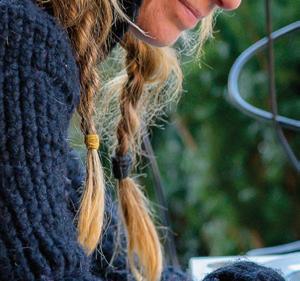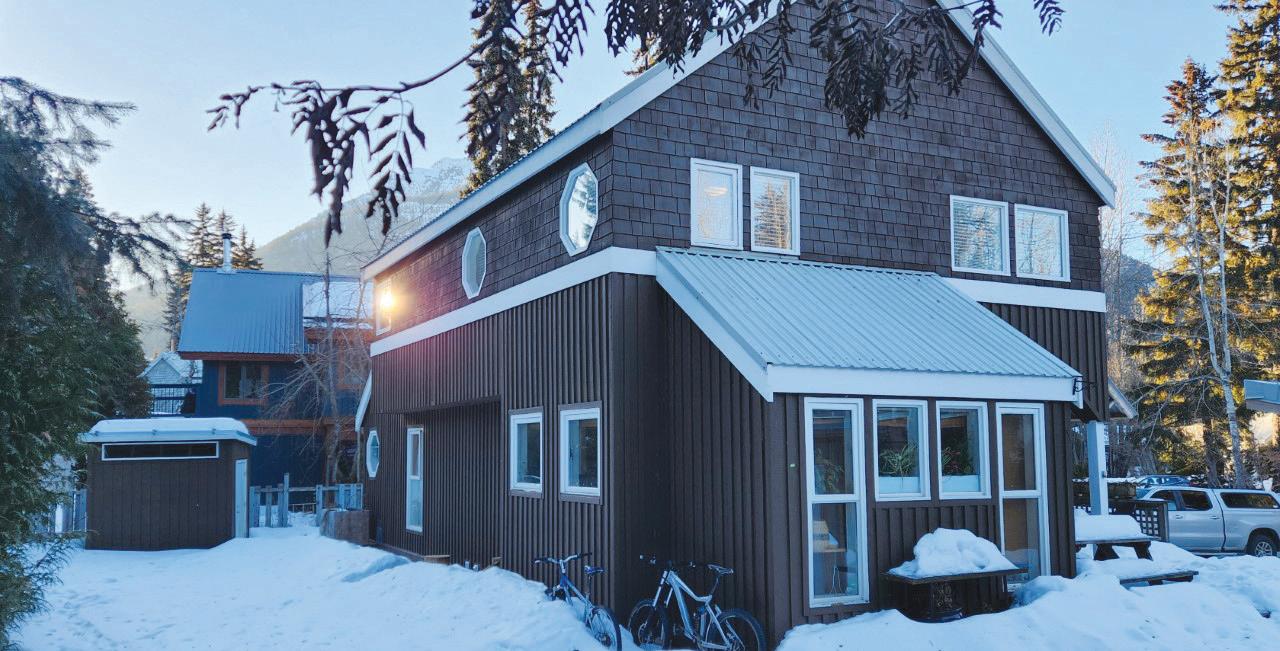












































































32
28














































































32
28
Why the Sea to Sky is now the most non-religious region in British Columbia. - By
Robert Wisla38
14 STAY AWHILE Thanks in part to lobbying from local stakeholders, some employees on working holiday visas can extend their stays in Whistler.
15 WHA UPDATE The Resort Municipality of Whistler’s five-year housing target is in sight, but the resort’s housing challenges aren’t going away.

16 OVER THE RAINBOW An online petition calls for the Resort Municipality of Whistler to go back to the drawing board on Rainbow Park upgrades.
A longstanding electrical substation in the heart of the Village of Pemberton is set for an upgrade.
Calgary’s Alexandria Loutitt flew to ski-jumping gold at Whistler Olympic Plaza last week.

Australian three-piece rock band Dune Rats hits Whistler for a pair of sold-out shows.
COVER Unless you’ve been dead for awhile and come back to life, you believe in something. Pretty pointless dying on a hill either way, taking others down with you in the process. May as well put all your faith in a god with two Os instead of one and get on with it. - By Jon Parris // @jon.parris.art















Founding Publishers KATHY & BOB BARNETT
Publisher SARAH STROTHER - sstrother@wplpmedia.com
Editor BRADEN DUPUIS - bdupuis@piquenewsmagazine.com
Sales Manager SUSAN HUTCHINSON - shutchinson@wplpmedia.com
Production Manager AMIR SHAHRESTANI - ashahrestani@wplpmedia.com
Art Director JON PARRIS - jparris@wplpmedia.com
Advertising Representatives
TESSA SWEENEY - tsweeney@wplpmedia.com
GEORGIA BUTLER - gbutler@wplpmedia.com
Digital/Sales Coordinator AMELA DIZDARIC - traffic@wplpmedia.com
Production production@piquenewsmagazine.com
Features Editor BRANDON BARRETT - bbarrett@piquenewsmagazine.com
Arts Editor ALYSSA NOEL - arts@piquenewsmagazine.com
Social Media Editor MEGAN LALONDE - mlalonde@piquenewsmagazine.com
Reporters
BRANDON BARRETT - bbarrett@piquenewsmagazine.com
MEGAN LALONDE - mlalonde@piquenewsmagazine.com
ALYSSA NOEL arts@piquenewsmagazine.com
ROBERT WISLA - rwisla@piquenewsmagazine.com
DAVID SONG - sports@piquenewsmagazine.com
Classifieds and Reception mail@piquenewsmagazine.com
Office and Accounts Manager HEIDI RODE - hrode@wplpmedia.com

Contributors G.D. MAXWELL, GLENDA BARTOSH, LESLIE ANTHONY, ANDREW MITCHELL, ALISON TAYLOR, VINCE SHULEY
President, Whistler Publishing LP
SARAH STROTHER - sstrother@wplpmedia.com
08 OPENING REMARKS An expensive, rained-out vacation prompts editor Braden Dupuis to explore the whys of our great, expansive itineraries.
10 LETTERS TO THE EDITOR
This week’s letter writers weigh in on the state of Whistler Blackcomb under Vail Resorts, the plight of local landlords and congestion on Highway 99.


13 PIQUE’N YER INTEREST
Being a sports reporter doesn’t make you better than anyone, writes columnist David Song—so why do some act like it does?
62 MAXED OUT As Whistler’s new council sets its strategic direction, how will a social housing policy be incorporated into the mix?
27 RANGE ROVER Humans like mammoths so much that they may be the first animal to undergo “deextinction,” writes Leslie Anthony.
36 EPICURIOUS When it comes to the perfect cocktail, it’s all about the story—just ask The Raven Room’s Dani Crowley.

42 MUSEUM MUSINGS The Molson World Downhill in Whistler was more than just a race; it was also the centrepiece of a five-day festival called Winterfest.
Newsmedia Council, which is an independent organization established to deal with acceptable journalistic practices and ethical behaviour. If you have concerns about editorial content, please contact (edit@ piquenewsmagazine.com). If you are not satisfied with the response and wish to file a formal complaint, visit the web site at mediacouncil. ca or call toll-free 1-844-877-1163 for additional information. This organization replaces the BC Press council (and any mention of it).
ISSN #1206-2022
Subscriptions: $76.70/yr. within Canada, $136.60/yr. courier within Canada. $605.80/ yr. courier to USA. GST included. GST Reg. #R139517908. Canadian Publications Mail Product Sales Agreement #40016549.


































I STOOD AT THE ENTRANCE of the Maui Dharma Centre in Paia, HI, reading about the circular prayer bell inside, an old man pacing laps around the temple.
“Give it a ring,” he said as he shuffled slowly, deliberately past, sizing me up through his vacant stare without stopping his prayer walk. He could have been anywhere from 45 to 70.




“It’s an auspicious day to do it.”
BY BRADEN DUPUISI wasn’t sure what he meant by that. It was the last day of January, and the first truly sunny day to hit anywhere on Maui since we had arrived a week earlier.
But I always knew I was going to ring the prayer bell.
And so I rang it, slowly and deliberately, three times before heading back out to the street where my partner was waiting.
I wanted to know more about the strange man, I said—where he’d been, and all the diverging paths that somehow brought him to this plodding, clockwise prayer march at a tiny Buddhist temple in Hawaii.
“I don’t,” was my partner’s response, followed by something about not buying into Eastern religions—or religion in general (a growing trend here in the Sea to Sky and beyond—see this week’s cover feature on page 28).
Fair enough. Like her, I consider myself a realist—but in somewhat contradictory fashion, something of an idle dreamer, too, and every now and then, like so many countless souls before me, I feel the intoxicating pull of something much larger than myself.
Every now and then, something inside of me tells me to ring the prayer bell.
Though I was raised Catholic, these days I don’t subscribe to any one religion. Still, I’ve learned not to ignore those urges.
It was our final day in Hawaii, and the
previous six did not exactly come as advertised.
Like millions of other tourists, we flew west for sun and beaches.
Maui welcomes about 275,000 people every month, and in 2021, nearly 2.3 million tourists visited the Hawaiian island.
In a state of cumulative exhaustion and grief, the winter warmth and endless crashing waves promised a much-needed reprieve for the soul.
Instead, a rare, stagnant weather pattern settled over the whole of Maui, drenching hiking trails, washing out roads and confining us, for the most part, to our third-floor condo, with little more than some Adam Sandler classics and a Harry Potter marathon on the TV to pass the time.
A flash flood warning covered the island, then hit us directly on the street outside our condo, rushing up the sides of our rented minivan and sending our windshield into a perpetual state of fog/defog.
Later we would learn that a maintenance worker was sucked into one of the drains we drove past that afternoon, and is still in critical
Why did we have to spend all this money to come here? Why couldn’t the weather just do what it has done for millions of other Hawaiian tourists since the advent of air travel?
Poor, hard-done-by me. World’s smallest violin.
My experience isn’t even unique. Think of all those Whistler guests who spend thousands to come ski, months in advance, having no choice but to hope it snows a decent amount beforehand and doesn’t rain or worse during their precious one-week reprieve.


Like so many other things in life, sometimes travel requires a leap of faith.
This particular excursion did not meet the lofty expectations I had set out, but it did inspire in me some more general introspection on tourism, and the broader whys underlining our great, expansive itineraries.
Why do we travel? So we can have perfect, predictable weather, unchallenging experiences, no sense of drama?
An airtight itinerary of carefully curated interactions?




Maybe, but perfect and predictable is
Walking the Dharma Centre’s old, wooden bell inside the temple that day, the words peace and acceptance appeared, unprompted, to guide my impromptu prayer.
Peace with what is, and cannot be changed.
Acceptance of what is to come.
I said the two words silently to myself, rotating the prayer bell three times inside the temple.
Walking back onto the street, I could already feel the powerful placebo effect of my brief meditation taking hold.
And before long, the bitterness gave way to gratitude—even if Murphy’s Law wasn’t finished with our vacation yet.
Packing for the airport a few hours before our flight, I tore the zipper clear off one of our checked bags—leading to a stressful, frenzied trip to the nearest drug store for Saran wrap and duct tape, and a handwritten note pleading TSA not to tear into the nowfunctionally-uncloseable bag.
And somewhere in the midst of it all, my off-the-cuff prayer played its part, placing me at peace in the absurdity; accepting of yet another perfect plan gone awry.
condition after being swept out to sea.
A security guard at our complex told me he’d never seen it like this in 15 years—a sentiment repeated by a Maui longtimer from Wisconsin one night at the communal barbecues.
Then the propane ran out, and the barbecues—and communal hot tub—were roped off.
Do you ever feel like a destination wants you, specifically, to leave?
I felt, for the first time, the bitter, furious rage of a tourist scorned.
boring, and travel is about so much more than just picking up and physically existing somewhere else for one or two weeks at a time.
At the heart of it, tourism is a personal exploration of consciousness, existence and purpose—for me, anyway.
But it can also be a fool’s errand. We can’t control the weather. We can’t predict the unpredictable, or plan every step along the journey.
After a certain point, we can only make the most of what we get, and be grateful.
Religious or not, my partner felt it too.
“I love this,” she remarked at some point in the ensuing chaos, referring to the chaos itself, or maybe just the unforgettable stupidity of it all.
Being in a new place, experiencing new things, and just taking everything in stride, or in this case, going with the flow of the current in the flash-flooded streets.
One last unpredictable detour to ensure we won’t forget our first trip to Maui.
I can make peace with that. ■
[S]omewhere in the midst of it all, my off-the-cuff prayer played its part, placing me at peace in the absurdity; accepting of yet another perfect plan gone awry.









Whomever is allowed to speak on behalf of Vail Resorts, please stand up.
G.D. Maxwell’s column, (“Find the love, Vail Resorts,” Pique, Jan. 5), and Ken Mason’s letter (“Letter: You don’t know what you got till it’s gone,” Pique, Jan. 12) hit the mark with regards to the management of Whistler Blackcomb since Vail Resorts took over. They covered most of the disappointments: delayed access-lift openings, the constant stopping of lifts due to maintenance issues, the poor or non-existent grooming on many runs leading to overcrowding and unsafe conditions on the few groomed runs, the poor selection and outrageous price of the food, the embarrassing and useless Epic App, as well as the insincere and self-serving questionnaire that Vail Resorts sends me after every ski day. “Do I feel excited and invigorated when I am on top of the mountain?” Of course I feel excited to be on top of one of British Columbia’s most beautiful mountains. But that is no thanks to Vail Resorts.


I felt invigorated in the ’70’s, ’80’s and ’90’s, or long before Vail Resorts had anything


to do with the mountain. In fact, my excitement wanes and my anxiety rises when Vail Resorts has anything to do with my ski day. It starts with trying to find a parking spot. Vail has confiscated a quarter of the parking spots that were formerly for paying guests in Lot 5. Today those spots are reserved for staff, and the officious towing signs are everywhere. Never mind that many of the staff cars have a foot of snow on them and are obviously being warehoused there. The same situation exists in Lots 6 and 7, although to a lesser degree than in Lot 5. This year, towing has become even more aggressive, which is inexcusable. On crowded days, cars formerly could park on the side of the roadway from Lot 6 and 7, creating
30 or so spaces, but Vail has put an end to that. Why? It was never a safety concern.









I don’t want to rehash Mason’s valid comments about high-priced food, except for this: Last month I was deciding between a soup or a bowl of macaroni. The $12-plus-tax soup was thin, and was served in a wide-brimmed bowl, three-quarters full. Why do I mention the bowl? Because a wide-brimmed bowl makes soup subject to spilling while being jostled in a crowded restaurant, and soup cools to room temperature in such a bowl before a skier can find a table. Vail Resorts: you’re in the ski business. How could you not figure this out? The macaroni looked like a child’s portion (although it wasn’t meant for a child) for $14



plus tax. It looked to be marginally better than Kraft Dinner. A box of Kraft Dinner costs $2 or less retail, and provides four servings the size that Vail Resorts is serving. Four servings of Vail Dinner would cost $56 plus tax. As Mason remarked in his letter, the price of food is disgraceful and outrageous. I didn’t buy either soup or macaroni, and aside from the odd coffee, I won’t spend another nickel on Vail Resorts’ food. I’ll be bringing a backpack with a sandwich, even though Vail Resorts has removed all of the hooks that formerly allowed families to hang a backpack.
It is the morning of Jan. 17 as I write this letter. It is pouring rain outside my Whistler condo. The Epic App tells me that the village temperature is -7 C and that the alpine temperature is -9 C. I wonder if it is raining in the alpine. How would you know? Finally, at 1:30 p.m., the app reports the correct village temperature to be 2 C. Vail Resorts: you are not only greedy, you are incompetent.
Last winter, I visited the ski areas of Revelstoke, Golden and Lake Louise. I made a point of asking the locals what they thought about their ski mountain. For the most part they were proud of their mountain, and other than small complaints, were positive about their mountain management. The restaurants were relaxed and although the quality of food might have been similar to Vail, the prices were nearly half of what Vail charges. What did surprise me was the level of local knowledge that the atmosphere was toxic at Whistler. No
one wanted Vail Resorts running their ski area. I have asked this question before in Pique, and I will ask it again. Geoff Buchheister: where is your voice in all of this? You are apparently first in command at Whistler Blackcomb, but you say nothing. Perhaps you have no authority and are not allowed to speak, in which case these problems may not be your fault. If so, please provide the name of the Vail Resorts executive who can speak on these issues to local Whistler residents. The silence by Vail has been deafening, and goes beyond arrogance. No reputable company treats their customers this way.
Jim Pipe // Whistler



The easiest way to fix our highway woes is through regional transit
E-bikes, counterflow third-highway lanes, speed limits, ridesharing, valley gondolas, autonomous vehicles, high-speed rail, Big Moves—lots of great ideas have been circulating lately about how to solve the traffic problem on the Sea to Sky Highway. Now that the pandemic is behind us and visitors are returning in droves, I appreciate Peter Ladner (“Letter: Whistler should add dedicated bus, taxi, e-bike lane on Highway 99,” Pique , Jan. 12) reminding us about induced demand: if we build it, they will come—more cars, that is, to fill any new highway lanes.
The easiest demand management is our








full-time residents who know better than to drive northbound on Friday afternoons and Saturday mornings, and southbound on Saturday and Sunday afternoons and evenings. Most of the rest of the traffic is coming to and from the Sea to Sky and the Lower Mainland—a lot of people need to move between these communities for work and play. They feel best served by private vehicles, and there just isn’t enough highway for all of us to move around that way.
So, what’s the simplest way to reduce the number of vehicles on the road and cut back on congestion, crashes, wait times and highway closures? Regional transit has to be a big part of any solution. Public transit connecting Mount Currie, Pemberton, Whistler, Squamish, Lions Bay, Britannia, Furry Creek and Horseshoe Bay with Metro Vancouver is so clearly and urgently needed. Local governments and First Nations have been advocating for regional transit for years, but don’t have the tools to do it on their own. In Metro Vancouver, an 18.5-cent-per-litre fuel tax funds the TransLink public transit system. Drivers in the Sea to Sky don’t pay this tax, but still pay a similar or higher price for fuel, with no access to regional transit.
Regional transit is a multi-purpose solution that connects communities, reduces road congestion, tackles climate action, increases personal safety, and offers an affordable, equitable transportation solution to residents and workers of the Sea to Sky. After a decade

AS OF TUESDAY, FEB. 7

The week started and will be ending with a bang. Earlier this week, a storm hit the Sea to Sky region, bringing 20 to 30 centimetres of snow and strong southerly winds. This storm system also increased the freezing level to about 1,000 metres, leading to rain at lower elevations. Mid-week we saw a short-lived lull in the weather. Another system arrived early in the morning on Thursday. This storm is expected to come in two pulses. We expect more snow (about 50 to 60 cm) and wind on Friday. Wind slabs will be abundant at higher elevations. The first storm system arrived warm and then cooled. The second system is shaping up to do the same. This is good news, as it will make it easier for the new snow to bond to older surfaces. However, this increased load will also increase the avalanche hazard in the short term.
This week’s new storm snow will be sitting on a variety of older surfaces, from windaffected to hard crusts. Although these storms
are typical for our area, they are adding to a snowpack that is atypical for the Sea to Sky region. The snowpack is still relatively thin for mid-February. Buried weak layers that usually would have consolidated by now can still be triggered and may be “woken up” by this increased load. A crust from mid-January buried 40 to 70 cm down is one of these layers. It is at just the right depth to cause a natural avalanche or be triggered by an unsuspecting rider.
Tricky conditions require a conservative approach to terrain. This is a good weekend to ride your favourite run at the ski resort. If you do decide to head into the backcountry this weekend, make sure to play it safe and make conservative choices. Avoid areas with long, continuous steep open slopes, shallow areas like rocky outcrops, and wind-affected areas where slabs have built up. Give this new snow time to bond and stabilize—it won’t take long. Backcountry users should always check the latest avalanche forecast at avalanche.ca ■
CONDITIONS MAY VARY AND CAN CHANGE RAPIDLY Check for the most current conditions before heading out into the backcountry. Daily updates for the areas adjacent to Whistler Blackcomb are available at 604-938-7676, or surf to www.whistlerblackcomb.com/mountain-info/ snow-report#backcountry or go to www.avalanche.ca.
or more of planning, regional transit is still stalled, with no action from the provincial government. It is an important element of an advanced, coordinated region, and it needs to happen now.
So, public pressure is needed once again! The BC Greens are asking West Vancouver-Sea to Sky residents and voters to sign this online petition, expressing your strong support for regional transit in the Sea to Sky, and write to those responsible for making it happen. I really hope this year will be the one—it’s 2023, and it’s time.

[Editor’s Note: Valeriote was the BC Green candidate for West Vancouver-Sea to Sky in the 2020 provincial election, and is a director of the local BC Greens riding association.]
 Jeremy Valeriote // Whistler
Jeremy Valeriote // Whistler
Eby’s spending spree should be reined in Government’s role is to seemingly spend ever more money. Have you ever heard of a government spending less? (Save former B.C. Premier Bill Bennett and his Socreds, circa early 1980’s.)
BC NDP leader David Eby is the poster child for spending. Eby recently named Dr. Penny Ballem as his special adviser on health. Doug White is Eby’s special counsel on Indigenous reconciliation. And the latest addition is former Victoria mayor Lisa Helps as Eby’s special adviser on housing.
White is earning a salary of $275,000 a year; Ballem, who is working on a part-time basis, earns $165,000 a year; and Helps will get $80,000 for a six-month contract.

Why his ministers don’t fill these rolls makes no sense. There are more than 40 Executive Council members and Parliamentary secretaries in B.C. As an example, Lenovo Corporation, which has similar revenues to the province, has 18 senior executives.
Tax and spend. That’s the Canadian way.
Patrick Smyth // Whistler
Joke: how many EV chargers does it take to get Whistler day-trip skiers home at the end of the day? Punchline: a lot more than available.
OK, not very funny. But it’s not funny either when you need to charge your EV to get home and there is a 60-plus-minute lineup for the two public chargers in Whistler. It’s like having two gas pumps in all of Whistler that each take 30 minutes to fill a vehicle. There are other chargers, but they are inside private parkades and/or low power units that take hours to give enough charge to get you to Squamish, Vancouver, or Seattle.
Currently, there are a lot more gasoline than electric vehicles driving up and down Highway 99. However, this has to (and will) change to reduce carbon emissions. But lack of charging stations is a deterrent. Most car trips are short-distance commutes and manageable with current charging infrastructure. But the range anxiety
associated with a Whistler-type day trip is one of the main deterrents for people considering a switch to electric.
The Resort Municipality of Whistler (RMOW) made a commitment to zero emissions for 50 per cent of vehicle kilometres travelled by 2030. Vail Resorts made a public commitment in November 2021 to achieve net zero emissions by 2030. But the operating footprint of Whistler doesn’t end at the Creekside gondola. It’s time for Vail and the RMOW to step up and build EV infrastructure at scale.

 Euan Crawford // Whistler
Euan Crawford // Whistler

No one is blaming the rental housing crisis on decent human beings, be they landlords or tenants. I’m thinking this landlord (“Letter: As a local landlord, ‘my heart does not bleed’ for Whistler renters,” Pique, Jan. 31) read Pique’s recent deep dive into the dire housing situation seasonal workers find themselves in. No one said all landlords in the Sea to Sky are scumbags. A frightening number of them are gleefully charging as much as possible for substandard accommodation, but there are many lovely landlords as well. (Shout out to mine!)
To all those of you out there who are renting part or all of your home, and doing so at an affordable price and attending to the maintenance and upkeep of your unit—kudos. Just as there are good and bad landlords, there will be good and bad tenants. Both

parties should have the time and opportunity to check references and make informed decisions; however, our overwhelmed rental market has both landlords and tenants making rash decisions they soon regret. If you own an income property but don’t want the hassle of dealing with tenants, why not look at a property management company that will do the hard work for you? This way you get tenants that are vetted with references checked. This also keeps your property from sitting vacant and unused in markets that are crying out for housing.
Selling your property is your right as an owner. Property ownership is out of reach for my family and many like mine. We earn good money and save as much as we can. But paying 30 to 40 per cent of our income to rent and utilities does not allow us to save enough. Please stop suggesting all we need to do is save our money and buy something ourselves. If we could, we would.
Tania Chiasson // Pemberton n
“Please stop suggesting all we need to do is save our money and buy something ourselves.”
- TANIA CHIASSON
I’VE ONLY BEEN a full-time reporter for about three months, and there’s a lot I still have to learn. That said, I do know one thing: journalism is a field built upon human connection. No matter what you cover, you won’t be able to cover it well if people don’t want to talk to you. And why would people want to talk to you if you disrespect them?


 BY DAVID SONG
BY DAVID SONG
Apparently, this question did not cross the mind of some reporters who approached NFL running back Giovani Bernard in the locker room on Dec. 18, 2022 after the Tampa Bay Buccaneers lost their Week 15 matchup. Bernard fumbled a fake punt attempt, which helped the Cincinnati Bengals erase a 14-point deficit to prevail over his Buccaneers 34-23. It’s normal for sports journalists to talk with a player whose actions had a major impact on the game, but it is also normal to do so professionally.
That didn’t exactly happen here. According to a video taken by ESPN’s Jenna Laine, Bernard says something as he walks through a group of reporters, prompting some to respond belligerently with: “Well, you were injured all year,” and “what have you done for us to talk to you all year?” The Buccaneers
running back was visibly stunned and asked if he could see his family.
One man replied, “Just don’t say we didn’t talk to you all year.”
The video cuts out, and when it resumes, Bernard says that the botched trick play was his fault. The only reason we know about this tense episode is because Laine posted the clip to her Twitter account. Her caption read: “Bucs running back Giovani Bernard didn’t want to talk to the media about what happened on the botched fake punt. Here’s that interaction. Note: As reporters, it is our job to seek clarity on what happened, especially on the most pivotal play of a game.” It appeared as if Laine tried to justify her and her colleagues’ treatment of Bernard by sharing the video. That didn’t go over well. Many criticized her decision to make public a testy interaction with an athlete after a frustrating loss.
Three days later, Laine walked back her actions on Twitter and revealed that she’d apologized to Bernard in private. She claimed she was trying to illustrate how tense things can get on an underperforming team, but realized later that there was “no benefit” to posting the video. She also called Bernard “a better person than [her] for many reasons.”

I don’t know Laine personally, but I’m going to assume her apology is genuine. Either way, the incident reminds me of two other cases where sports reporters needlessly antagonized their subjects.
On Jan. 15, 2021, then-Philadelphia Flyers winger Jakub Voracek was asked by Philadelphia Inquirer columnist Mike Sielski about his feelings on the NHL’s shortened 56-game season that year. Voracek promptly tore Sielski to shreds.
“Doesn’t matter what I say, Mike, you’re gonna write f–king s–t every time,” he snapped. “It feels different, I mean… I wasn’t even gonna answer your question because you’re such a weasel, it’s not even funny. Next question.”
Why did a professional hockey player respond to a seemingly innocent query with such venom? It may have been because of a 2019 column where Sielski wrote that Voracek and former teammate James van Riemsdyk were laughing while head coach Alain Vigneault urged his top players to lead the Flyers. Sielski had also mocked Voracek’s trade value and appeared to blame him for the Flyers’ struggles in 2016, with both jabs delivered on Twitter.
About a year after Voracek’s outburst, Edmonton Oilers superstar Leon Draisaitl went head to head with Edmonton Journal reporter Jim Matheson. It was Jan. 18, 2022, and the Oilers had lost 12 of their last 14 games. When Matheson asked Draisaitl for the “No. 1 reason” why the team was struggling, the German forward replied, “Yeah, we have to get better at everything.”
“Would you like to expand on that?” Matheson queried further.


Draisaitl rebuffed him. “Nope. You can do that. You know everything.”
“Why are you so pissy?” Matheson demanded. Some athletes would have walked out of the press conference immediately, or incinerated Matheson the way Voracek did to Sielski. Draisaitl instead responded with passiveaggressive sarcasm, deflecting Matheson’s remaining questions until it was time for him to go.
I’m well aware that any good journalist needs to tell the full story. That sometimes means asking tough questions or portraying certain people in a negative or unwelcome light. Sometimes, we need to stand our ground when others take issue with us for doing our jobs professionally.
Yet, professionalism is based on respect, and there are ways to fairly criticize people and things without using the word “pissy.” Hot takes may be great for driving content engagement in the short term, but they do not foster long-term respect between a journalist and the subjects on his or her beat. We are hard-pressed to do our jobs properly when the people we need to speak with don’t wish to deal with us.
Being a sports journalist is a privilege. If you’re in this field, you get to make a living covering something that brings happiness and excitement to many. In return, you are (or should be) expected to tell the stories of sport in good faith: with truthfulness, insight and respect for the athletes you owe your career to. Find

RESORT EMPLOYERS HAVE SECURED ROUGHLY HALF OF THE 100 SPECIAL PERMITS OTTAWA ISSUED THIS WINTER, ALLOWING FOREIGN WORKERS TO EXTEND THEIR STAY IN CANADA
BY BRANDON BARRETTCANADA CURRENTLY has reciprocal agreements with more than 30 countries and territories allowing young adults to work abroad while experiencing a new culture. Technically speaking, this federal working holiday visa program is defined as a cultural exchange, but in Whistler, it has long been used for another purpose: filling the labour gap.
“Without that program, we really would never be able to staff our businesses in this town,” said Karen Bauckham, director of people and culture at the Westin. “All businesses rely on our foreign workers, and that’s no secret anymore. We’ve been saying that for years, but I think everybody is very aware of the labour shortage and how many people left our industry during the pandemic.”
The Westin is one of several resort businesses that have taken advantage of special permits that were issued by International Experience Canada (IEC) this winter, allowing eligible employees near the end of their stay to extend their working holiday visas. Bauckham said the hotel has secured nine special permits for Australian, U.K. and Chilean staff, who work across a variety of departments, including culinary, maintenance and housekeeping.
“It is people that have been working for us
long-term and are losing their homes and their leases because the owners want to turn around and rent it for higher rent or sell the property or what have you,” said Bauckham. “We have existing staff well established in positions coming to us saying, ‘I’m losing my housing at the end of the month, can you help me?’”
For local employers that lost foreign staff at the height of the COVID-19 pandemic and have struggled to keep up with resurging business levels this winter, the move comes as a welcome relief.
“It means someone from Australia who is here for close to two years, their visa is about to expire and they’re your key manager or a chef that is vital to your operation, this new work permit will allow them to stay an additional two years from Australia and one year from the U.K. and most other countries,” explained Joel Chevalier, owner and operator of Culinary Recruitment International, which pairs Canadian employers with skilled international workers, primarily in the culinary sector.
Of the 100 special permits IEC has handed out across the country on a firstcome, first-served basis, roughly half have gone to Whistler, primarily in the hotel sector, to Whistler Blackcomb, and to the Gibbons Hospitality Group. Chevalier said there is an additional 25 or so people on a waitlist for future permits.
The visa extensions come thanks, in part, to lobbying from several Whistler employers and the Canada West Ski Areas Association (CWSAA), who met with IEC officials last summer.
“The director and assistant director of the IEC program, this was not their first visit to Whistler. They’d been here on business but also on personal vacation, so they got it and
were very keen to do their best to ensure that these were good employers able to provide a great experience. They understood the benefit of having someone use their cultural experience in Whistler,” Chevalier said. “But at the same time, we weren’t beating around the bush and pretending we only cared about the cultural side. This wasn’t really in their mandate to help, but they did anyway.”
Given how reliant Whistler is on the working holiday visa program, Bauckham said she would like to see the option to extend foreigners’ stay be available on a permanent basis, a recognition of Whistler’s distinct labour needs.
“That would be a godsend, because you do end up with some really amazing associates who do a terrific job and want to stay,” she said. “In this day and age, with labour, if you don’t have a bed, you don’t have an associate. The ability to retain people becomes such a massive priority.”
Bauckham estimated that about 70 per cent of the Westin’s staff this winter are housed in staff accommodation, the highest proportion she can remember.
It wasn’t just extending working holiday visas that resort representatives lobbied for in their meetings with federal officials last year. Chevalier said Whistler also pushed Ottawa to allow foreigners on international student visas to work more hours in a given week. Previously, international students were only permitted to work a maximum of 20 hours a week off campus. Now, eligible students can
work full-time during scheduled breaks, such as winter and summer holidays, and fall and spring reading weeks. (The federal government said there is no set amount of hours to be considered full-time, but that employers would still need to follow provincial laws on overtime pay and time between shifts.)

“Pre-pandemic, at least, there were 600, 700 kids [in Whistler] here on international study programs,” Chevalier said. “If even half of those were working full-time, that’s increased the work-hour capacity of several hundred people.”
The Whistler Adventure School, which counts dozens of international students, welcomed the news when it was first announced, although school officials were hopeful the extended work hours would have applied to new or incoming students. As it stands, only students that applied for their study permit (including extensions) on or before Oct. 7, 2022, and were in Canada by Dec. 31, were eligible to work full-time.
“So our current students, all of those who have been here for a few months, they all get to benefit and their employers can benefit. New students, however, will be on the normal program,” said Whistler Adventure School GM Shelley Quinn, who said it is unfortunate the school can’t use the incentive to recruit new students, particularly given the cost of living and lack of affordable housing in the resort.
“It’s hard to make ends meet working part-time here,” she added. “If [international students] are not able to work full-time, a lot of those housing opportunities that come with a full-time job, those aren’t available. If it was extended to all students, it would be much more appealing.” n
OUT AND A BOOT International students can now work full-time while on school break. Pictured are students from the Whistler Adventure School learning ski boot-fitting.
MARLA ZUCHT, general manager of the Whistler Housing Authority (WHA), opened her presentation to elected officials this week with a caveat that seems to accompany any discussion of housing in this community: We can’t do it alone.
“What I’m going to present to you today is an overview of the Whistler Housing Authority’s 2023 corporate plan,” she said at the Committee of the Whole meeting on Tuesday, Feb. 7. “And spoiler alert: I am not going to be laying out for you how we can fix all of the community’s housing problems this afternoon.”
Even with the continued challenges around affordable housing, particularly at the lower-income end of the spectrum, there’s no denying how significant the WHA’s contributions have been. Since its founding 25 years ago, the municipal subsidiary has facilitated the creation of roughly 7,000 employee-restricted beds, and has, for years now, hit its stated target of housing at least three-quarters of the resort’s workforce locally.
And yet, for a variety of reasons both inherent to the resort as well as external pressures bearing down on tourism destinations across the globe, Whistler’s years-long affordable housing shortage persists—and the situation is dire. For context, a provincially mandated municipal housing needs assessment released last spring reiterated the need for more purposebuilt rental housing, as well as transitional and emergency housing for the community’s most vulnerable. Ultimately, the report concluded that the market alone could not be relied on “to provide these affordable, suitable, and adequate housing units for Whistler’s workforce,” as home prices have reached a point where the average market property is unaffordable for more than 90 per cent of residents, while market rental properties have dwindled as fewer owners look to rent to locals long-term.
That’s where the WHA comes in. “I don’t need to tell you that housing access and affordability are very real challenges for people living in our community, and that housing challenges facing our community are not going to be solved in one year or in one political term,” Zucht said. “However, just as Whistler has done over the last 25 years, collectively, with frequent and meaningful input from the community and government partners, we will continue to use impactful and innovative solutions, whether it’s creative funding and partnerships or novel housing designs and policies to keep moving forward on providing more housing opportunities for our workforce, so members working in our local community can remain living in Whistler.”
During Tuesday’s presentation, Zucht laid out the WHA’s core priorities for the year. First and foremost is continuing work with the Whistler Development Corporation (WDC) on the planning and development of additional employee housing in Cheakamus Crossing, particularly on Lot 2, where two new rental
projects are planned that, once completed, should add 78 units to the resort’s southernmost neighbourhood. The WHA also plans to facilitate the occupancy of the 54 new employee ownership units slated for 1360 Mount Fee Road in Cheakamus Crossing this spring.
With the new housing in Cheakamus and a small handful of private-sector developments, later this year Whistler is expected to hit the five-year target the municipality set in 2017 to add 1,000 new employee beds. Since that goal was established by the Mayor’s Task Force on Resident Housing, 748 new employee beds have been created in Whistler.
That will also help trim the WHA’s lengthy rental and ownership waitlists, which, by the end of last year, sat at 466 and 1,095 people, respectively (applicants can appear on both lists simultaneously). Zucht added that WHA’s annual ownership waitlist renewal process currently underway would “likely decrease [the number of applicants] by a few hundred in the next month.” A total of 121 ownership units were offered to the WHA waitlist in 2022, while 42 employee rental units turned over last year as well.
Looking ahead, the challenge, as it often is with affordable housing, will be financing.
“Right now, it doesn’t look like there’s much in the way of grant support, but certainly preferential financing support, which is most likely the route that we will be needing to go for acquiring financing for new development,” Zucht said.
“But it’s not likely to be in the form of a non-repayable contribution.”


Public education and engagement are two other priorities for the WHA in 2023.
Enjoy 5 weeks a year in Whistler in your own 3 bedroom slope side home in At Natures Door This ski in out residence offers swimming pool, hot tubs, g ym and owners lodge. B ook your viewing today.
 Nick Swinburne
Nick Swinburne
Personal Real Estate Corporation


Engel & Völkers Whistler


Phone: +1 (604) 932-8899

Email: connect@whistlerforsale com
Zucht said the organization would continue to “provide education to raise awareness and greater understanding and compliance with the various employee housing covenants” registered on new projects to ensure WHA’s inventory is being used for its intended purpose. Audits conducted last year resulted in the turnover and sale of six WHA homes to applicants on the ownership waitlist.
The organization continues to digitize its processes, which will include a new “smart ownership” database with new portals on the WHA website designed to enhance usability and data collection, which will be used to inform the municipality’s long-term housing strategy.
For more information, visit whistlerhousing.ca.
n
“[H]ousing challenges facing our community are not going to be solved in one year or one political term.”
- MARLA ZUCHT5454 STONEBRIDGE DRIVE $24,950,000
A NEW ONLINE PETITION is rapidly gathering support in its call to review the second phase of planned upgrades to Rainbow Park, set to begin later this year.
Launched on Jan. 23 by local tobias c. van Veen, the petition gathered more than 1,000 signatures in two weeks. The aim is to have the municipality review the planned redesign of the park and do more community engagement before breaking ground.
van Veen’s primary reason for launching the petition concerns the addition of more paving in the park. He takes particular issue with the planned widening and extension of the Valley Trail, the creation of a new beachfront promenade, and a paved food truck plaza.

“I want as wild as possible, accessible as possible, to the point of remembering it is still a natural park, green space,” van Veen said. “I think that Rainbow Park should preserve its cultural heritage and it should protect its natural state, and any upgrades should be based upon those two fundamental principles.”
The planned upgrades will make substantial alterations to the layout and design of the park, which exploded in popularity during the COVID-19 pandemic.
The upgrades will expand the small








natural beachfront into a more extensive, sandy beach; create a new dock and hammock space; incorporate a paved food truck plaza; and expand the Valley Trail in the park alongside the beach, in addition to infrastructure improvements to fix the park’s drainage, irrigation and sewer system.

The beachside promenade is a particularly cumbersome issue for many opposed to the new design, as it will disconnect the park’s grassy area from the expanded beach area and result in more traffic alongside the waterfront.
“This is ludicrous,” one resident wrote in support of the petition. “We need to keep nature as natural as possible, not put more concrete in. Closing this park will put added pressure on other areas, causing more problems. We don’t need a paved path dividing the water and the grass. We need our money better spent, not on ridiculous upgrades but on necessities.”
The Resort Municipality of Whistler cited the need to improve accessibility to the beach for individuals who use wheelchairs as one of the main reasons to create the promenade, as people currently have to make their way over the often-waterlogged lawn to access the dock.
The plans to improve the park arose from the 2021 Summer Experience Plan and Outside Voice engagement process, which the RMOW crafted to deal with surging user numbers to the municipality’s lakeside parks.
van Veen believes that, while many of the infrastructure improvements have merit, the community is not clamouring for the park to be changed. He also feels there hasn’t been enough consultation on the design, which, in his view, is significant enough it should have been an election issue.
“I think the design itself, in a way, needs to be vetted by the community. This is a community park. It shouldn’t just be left to designers in the offices,” van Veen said.
“This is a part of what makes Whistler, Whistler, and to suddenly change the park so drastically that we’re bringing in permanent commercial operators, then putting in a paved promenade—this should have been a campaign issue.”


The provincial government is covering the project’s $4.7-million price tag through Resort Municipality Initiative funding, and it is one of several park improvement projects planned over the next few years.

Efforts from local residents to revisit the park plans may yet prove successful, as the final design has yet to be confirmed with a contractor. Though accessibility to the waterfront remains a priority for the municipality, officials are open to considering minor adjustments to the design and addressing community input.
“[The] response to the Rainbow Park rejuvenation has been overwhelmingly


positive, though staff are carefully considering the thoughtful questions surrounding the pavement placement and will consider modest adjustments that meet the design intent, accessibility concerns and address recent community input,” an RMOW spokesperson said in an email.
“In the meantime, the question our team will continue to consider is how to balance the needs of those who use wheelchairs accessing the dock and the concerns expressed by these residents about the placement of the Valley Trail.”
Councillor Ralph Forsyth, council’s representative on the Recreation and Leisure Advisory Committee, believes the upgrades are needed to deal with the increased user numbers as the community is “loving the park to death,” and that any considerable redrawing of the design would result in significant delays and cost increases.

“I think there’s probably room for some [amendments], but we’re not going back to the drawing board with this. That’s wasteful. That would not be a good use of our money,” he said.
The estimated construction timeline will see the park close either this spring to the fall, or the fall until spring 2024. The exact closure timeline, the final design, and what access will look like during construction will be determined once the RMOW approves the contractor, likely in April. n


































BRITISH COLUMBIA’S experiment in drug decriminalization has officially begun.
A provincial exemption to the federal Controlled Drugs and Substances Act went into effect on Jan. 31, making B.C. the first and only province to allow adults 18 and older to possess up to 2.5 grams of certain illegal substances for personal use, including heroin, fentanyl, cocaine, methamphetamine and MDMA. The pilot is due to expire in three years, on Jan. 31, 2026.
That means rather than seizing drugs, police who encounter people in possession of these substances will instead offer information about health and social supports. B.C. officials say decriminalizing small amounts of the exempted substances will help reduce the numerous hurdles that prevent people from accessing those services, with the ultimate goal of saving lives.
“Instead of being treated as a criminal, they will be treated with care and compassion. It will help break down stigma; the fear and shame around substance use,” said B.C. Minister of Mental Health and Addictions Jennifer Whiteside during a press conference in Vancouver on Jan. 30.
The province calls the policy change “a

critical step in B.C.’s fight against the toxic drug crisis” that has claimed more than 10,000 lives since British Columbia first declared it a public health emergency in April 2016.
Whistler Community Services Society’s (WCSS) outreach team has been working with local RCMP to get the message out about decriminalization through initiatives like its peer educator program and naloxone training sessions, said WCSS outreach services program manager Lisa Coulter.
“It’s been integrated into our outreach meetings from when we first found out about decriminalization, and there hasn’t been a single time that our outreach team has had a negative response to it,” Coulter said.
The policy “is reducing the fear and shame—it’s people’s fear [that is] keeping their drug use silent, so now they don’t need to hide their drug use,” she added. It means those who actively want help “don’t need to avoid accessing treatment and support for it as well.”
Still, some critics say that while the policy change is a step in the right direction, the 2.5-gram threshold is too low, and argue decriminalization alone won’t improve the drug crisis unless it is accompanied by increased access to support services and safer supply.
WCSS is working hard on both fronts, said Coulter.
One new program for Whistler is the “Situation Table” or “Hub,” an initiative that will
bring key community stakeholders like WCSS, the RCMP, Vancouver Coastal Health, the Howe Sound Women’s Centre, school counsellors and more together for in-person weekly meetings, with the goal of identifying high-risk community members and discussing how best to support those individuals from a holistic perspective.
Meanwhile, a newly purchased drugtesting machine called an FTIR spectrometer was installed in Whistler on Feb. 8, Coulter said. Once WCSS staff complete the necessary training, the equipment—which is frequently available at music festivals and supervised overdose prevention sites throughout B.C.— will be available to anyone looking to find out exactly which substances are in any drug they plan to consume. “It’s not meant to say either ‘don’t do this drug’ or ‘do it,’ just so people are a bit more informed about what they’re taking, and then they can make that decision on their own,” Coulter explained.
For now, WCSS will continue encouraging Whistlerites to employ harm reduction strategies like avoiding using drugs alone; making use of life-saving tools like the Lifeguard app, naloxone kits and fentanyl testing strips available at WCSS headquarters; and helping anyone who is actively seeking support, whether through the range of programs and services available within the corridor or by connecting those individuals with appropriate resources outside of the Sea to Sky community.
“Our main role is to provide a safe, confidential, non-judgmental space to really talk about absolutely anything,” said Coulter. “There’s really no issue too little or too big.”


Neither the province nor the federal government have implemented laws banning public consumption of the drugs covered by the exemption. Local governments are, however, authorized to enact bylaws restricting public substance use, as Vancouver Island’s Campbell River did last month in advance of the exemption’s start date.
Some advocates say those bylaws only perpetuate the shame and stigma B.C.’s decriminalization aims to eliminate in the first place.
No such bylaw has been passed locally, a spokesperson for the Resort Municipality of Whistler (RMOW) confirmed Tuesday.
Police have legal authority to remove people found openly using drugs from private property, like restaurants or cafes, at the request of that property’s owner or operator.
It remains illegal to carry these substances, regardless of amount, while on the premises of elementary or secondary schools, licensed child-care facilities, or at airports. The measure does not apply to anyone under the age of 18. Drug trafficking remains illegal, and could result in criminal charges for those caught selling substances.
- With files from Graeme Wood n

















LOCAL CONSERVATIONISTS WORRY THAT RESTRICTING ACCESS TO ALTA LAKE FOR PARK UPGRADES THIS YEAR WILL PUT UNDUE STRAIN ON THE RESORT’S OTHER DESTINATION LAKES
 BY BRANDON BARRETT
BY BRANDON BARRETT
LYNN KRIWOKEN has spent 40 years visiting her family’s rustic cabin on the shores of Alta Lake. As she has watched the resort grow up around it, and the rush of tourists that have followed, she can’t help but wonder what one of Whistler’s most prominent historical figures might think about it all.
“I often wonder what Myrtle Philip would say from an experiential perspective about Whistler,” said Kriwoken, whose grandfatherin-law was a contemporary of Myrtle and Alex Philip. “I think of her back in the ’40s with her fishing lodge down in Rainbow Park. The lakes are here for the enjoyment and use of the public and the environment, and we have to find ways to manage for all the values that are out there.”
Kriwoken is the current president of the Whistler Lakes Conservation Association (WLCA), a group of citizen scientists that monitor the health of Whistler’s lakes, efforts that recently earned them (and Kriwoken herself) annual awards from the BC Lake Stewardship Society. Retired from a career in water resource management at the province, Kriwoken joined other conservationists in expressing her concern for the impacts to Whistler’s other four destination lakes, with the municipality planning a months-long closure of Rainbow Park—the main access point to Alta Lake—for upgrades later this year.
“I think it’s inevitable,” she said. “People aren’t going to stop coming to Whistler.”





While there’s no firm data on lake use, Whistler’s parks are a good indicator.
According to municipal metrics, 2021 was the busiest year on record for resort parks, with Rainbow, Lost Lake, Lakeside and Alpha Lake parks visited an estimated 176,000 times, 35 per cent more than in 2020 and 77 per cent more than 2019.
Green Lake, Whistler’s largest lake and a popular spot for recreationalists, boaters, and floatplane pilots alike, stands to bear at least some of the overflow from Rainbow Park’s closure. A hub of biodiversity that is home to a wide variety of wildlife, including the more than 200 of the roughly 270 bird species in Whistler, Green Lake was the focus of a recent dossier the WLCA asked lakeside resident Fred Shandro to prepare, compiling the issues he’s noted on Green Lake over a period of more than 20 years.
In a nutshell, Shandro and other lakeside residents’ concerns centre on the use of motorized boats on the lake and the shoreline erosion caused by their wake.
“There are people down the lake from us who talk about being able to extend their arms two feet further under the lakeshore than they ever had before, which obviously resulted from the curling of these wakes,” Shandro said. “Honest efforts have been made to control where the wake is … but that isn’t the solution. It’s the wake itself that has to be stopped.”
In 2004, the Resort Municipality of
Whistler (RMOW) passed regulations designating two no-wake, no-tow zones at either end of Green Lake, where speeds were restricted to a max of 10 kilometres an hour, in theory to minimize disturbances to residents and bird nesting sites. Studies have shown that a wake boat’s waves don’t dissipate for 300 metres, compared to roughly 30 m for traditional recreational watercraft, and create a disturbance to a depth of six to eight m.
As an award-winning environmentalist, Arthur De Jong shared Shandro’s view that motorized craft don’t belong on local lakes.
“As a climate advocate, I passionately support non-mechanized forms of transportation in Whistler, and motorboating is certainly not one of them,” he said.
But as a municipal councillor, he stressed that the RMOW has to balance its core priorities against available staff time and resources when considering Green Lake.
“Our staff have limited capacities, and this is not up there on the list with climate change and housing and the Balance Model—but it matters. So, I’m listening,” he said. “It’s multilayered and a public asset. I appreciate [Shandro’s dossier]; there certainly were some concerning points about public safety and the environmental impacts, but I need to get a collective input [from local environmental groups and RMOW staff], if you will, to gain a better understanding of where, potentially, we take all this.”








One idea Shandro has pushed for is implementing a reservation booth at the boat launch on the north end of Green Lake, which would allow the RMOW to better manage the number of boats on the water and educate visitors about the proper lake-going etiquette.
“It would stop the boaters that had no intention of obeying the regulations. Such as it is, there are boaters that go out there on long weekends that really don’t care what the sign says. So, at least it would stop those people,” Shandro said. n
AFTER NEARLY FOUR decades of operations, the Whistler Creek Athletic Club (WCAC) is closing its doors for good.
Whistler’s only gym at the time opened as “The Pumphouse” in the basement of Creekside’s Whistler Creek Lodge in 1984, but had been operating under its current name since the ’90s when Hannah Edleston took over the business in 2015.

“I went there as a member previously and it is just such a fun locals’ place,” Edleston said. “It’s just a laugh … it’s about the crew; it’s about the people. I think that, even though we’re in a basement, people come to us for the community and the fun.”
That said, “in the nicest possible way, it was an absolute dump when I bought it,” remembered Edleston. “But it was my dump.”
Aside from its name, the location has undergone significant changes over the years, including a full renovation under Edleston’s ownership: squash courts replaced with CrossFit-style training studios and weightlifting racks, an old resistance-machine circuit tossed to make way for new gear, and staff members who have come and gone. (Well, for the most part. Edleston offered particular thanks to trainer Mandy Dobbs,
who has been working with the gym for more than 30 years: “As staff retention goes, she’s it,” Edleston explained. “She’s been a pillar.”)
The one constant has been the sense of camaraderie the space has fostered, Edleston said, adding, “so many of the staff and members, their whole friendship groups stem from the gym.”
For Edleston, owning the gym spurred philanthropic initiatives like the “Youth in Sport” foundation she launched and the annual Brandywine Boogie she helps organize as part of
want to make it accessible for everyone.”
Edleston attributed the difficult, emotional decision to close to a spike in rent that was unsustainable for the business. She was hoping there would be time to, ideally, negotiate a new rate and find some creative solutions to make that rate fit within WCAC’s budget, but said a new tenant for the space has already been secured. “So that was the end of that,” she said.
The shutdown is as heartbreaking for Edleston as is it for the crowd of former and
“I figured out a way to buy a business without any money,” she said. “I don’t know how I did it; it was a miracle … People don’t think you can do stuff like this, but I want people in Whistler to know it is possible. You can do it with a bit of thinking outside the box.”
For Edleston, “the community and being able to impact people with the business has been absolutely amazing,” she said through tears.
“I just want to thank everyone for coming in, having fun with us, working out with us and just making the last nearly eight years of my life an absolute blast. That gym has been my absolute heart and soul.”

the Rotary Club of Whistler Millennium. Even through the economic turbulence and tight restrictions of the COVID-19 pandemic, WCAC also managed to keep its membership rates on the low end of the spectrum compared to other fitness offerings within the resort.

“My ‘why’ when I opened the gym was I wanted to make fitness affordable for everyone, and I wanted to make everyone feel comfortable,” said Edleston. “I have consciously kept my prices on the lower end, because I know how hard it is, especially right now, and I just
current clients who left comments underneath the closure notice posted to WCAC’s Facebook and Instagram accounts, particularly when she considers what the business has brought to her life since she purchased the gym eight years ago.
After all, Edleston was a self-described snowboard bum with zero business experience and nothing but $1,000, “a 2003 soccer mom van” and, of course, a snowboard, to her name when the opportunity came up, she explained, just three years after she moved to Whistler from her native U.K.
Clients with remaining drop-ins, tanning passes or personal training sessions are asked to make use of those before Feb. 21. Edleston said while some 12-, six- and three-month passes were sold before the business realized it would have to close, those individuals can reach out to info@whistlergym.com to obtain a refund for the time remaining on their pass following the gym’s last day. Edleston also plans to host a “first-come, first-served” equipment selloff in the coming weeks, and advised anyone interested to keep an eye out on local Facebook groups for more information. n
“
[T]he community and being able to impact people with the business has been absolutely amazing.”
- HANNAH EDLESTON
THE SPENDING RESULTS are in for B.C.’s 2022 municipal election, detailing a frugal campaign in the Sea to Sky.
According to financial disclosure statements posted by Elections BC, Whistler’s three mayoral candidates, Jack Crompton, Marcus Culver and Brian Walker, all spent and received no money during the October election. Crompton won with a significant majority, taking 67 per cent of the votes. The mayoral candidates were permitted to spend up to $15,031 on the campaign.
Regarding the campaign for council, the candidates spent fairly frugally, but significantly more than their mayoral counterparts. The race for Whistler’s six council seats was hotly contested, as two incumbents decided not to run for re-election, opening up the field for candidates with less name recognition.
Of the council contenders, businessman Brendan Ladner spent the most on his campaign, $5,180.15, twice as much as his nearest competitor. Ladner received 1,004 votes in his unsuccessful bid, almost 600 votes short of winning a seat. Ladner’s campaign was notable for being run almost entirely off the back of his e-bike, and for being the first campaign to set up signs in Whistler, which sparked several other candidates to follow suit.
Ralph Forsyth spent the second highest amount, at $2,718, winning re-election with 1,639 votes. Sarah Rush spent $2,226, earning 465 votes, followed by Cathy Jewett ($1,915, 2,262 votes), Curtis Lapadat ($1,418, 562 votes), and Jen Ford ($1,266, 2,198 votes).
First-time candidate Jessie Morden spent $1,249, earning 1,612 votes in her successful council bid, while the other non-incumbent elected to council for the first time, Jeff Murl, spent $818 and received 1,589 votes.
The remaining candidates’ spending varied wildly. Rhonda Millikin spent $1,075 (628 votes); Dawn Titus spent $763 (918 votes); Gabriel Pliska spent $197 (363 votes); and Gordon Jeffrey spent $45 (412 votes).
Arthur De Jong (re-elected to a second term), Melinda Lopez, Tina Pashumati James, and Anthony Butt, who bowed out after the writ dropped and could not remove his name from the candidate list, spent zero dollars on their campaigns. The candidates received 2,179, 663, 426 and zero votes, respectively. In total, Whistler’s candidates received $17,950.69 in donations and spent $19,291.92.
Up in Pemberton, the mayoral candidates spent significantly more than their Whistler counterparts as a fierce three-way race kicked off in the rapidly growing village in Spud Valley. Mayoral candidates accounted for 87 per cent—$5,085 of $5,779—of the total spent in the local election.

Come celebrate 30 years of making a difference.
Register a team to take part in the entire action packed weekend!
FRIDAY, MARCH 3 & SATURDAY, MARCH 4



TWO-DAY QUARTET - $2,700 (4 skiers/snowboarders per team).
Team package includes: Buffet Breakfasts, 2-Day Lift Tickets, Priority Lift Line Privileges, Ski With a Pro Adventure Day, Après-Ski, the Race Classic, plus tickets to the Whistler Winetastic and Grand Fina le Gala.
FRIDAY, MARCH 3

WHISTLER WINETASTIC PRESENTED BY REMAX SEA TO SKY REAL ESTATE Macdonald Ballroom, Fairmont Chateau Whistler
SPENDING FREE Whistler’s three mayoral candidates didn’t spend a dime on their election campaigns last year.
The lion’s share of the spending came from former Pemberton councillor and Pemberton Valley Lodge owner David MacKenzie. MacKenzie spent $3,254 in his unsuccessful bid, earning 303 votes. Chadi Abouhalka was next, spending $1,135 en route to 34 votes. Mayor Mike Richman spent the least and gained the most votes in his re-election bid, spending $696 and receiving 543 votes.
The top spender in the race for Pemberton’s four council seats was firsttime candidate Laura Ramsden, spending $380 (559 votes), followed by Jennie Helmer, ($289; 748 votes). Incumbent Councillor Ted Craddock spent $25 in his successful bid for re-election, taking 567 votes, while newcomer Katrina Nightingale spent zero dollars and earned 587 votes.


The local school trustee election saw little spending. Only three of the 11 candidates across School District 48 spent any money on the campaign: Margo Vaughan in Area C, who spent $323 in her unsuccessful challenge of longtime trustee Rebecca Barley; Whistler trustee Cynthia Higgins, who won re-election with 1,527 votes, and spent $40; and April Lowe of Squamish, who spent $231, and was elected by acclamation.
The four Squamish-Lillooet Regional District (SLRD) candidates spent zero dollars due to all four directors being acclaimed, requiring no campaign. n
6:45pm to 7:30pm | VIP First Sip - $30* (inclusive)
*Main event ticket required as well. Exclusive special pours only available at VIP First Sip.
7:30pm | Main Event - $95 (inclusive)
A unique wine tasting event with live entertainment and an extensive collection of wine, beer, spirits and delectable appetizers from local restaurants including Portobello, Bearfoot Bistro, Caramba/Quattro, Sidecut, Purebread and more.
AN UNDERWATER DREAM






SATURDAY, MARCH 4
SUBMERSE GALA PRESENTED BY SAMSUNG





Whistler Conference Centre
7:00pm-midnight | $275 (inclusive)
Dive into a world of vibrant coral reef and magical kelp forests. Enjoy mingling with mermaids, cocktails with whales and dancing with dolphins. Our deep sea performers, art installations and delicious cuisine will leave you truly spellbound.



To purchase tickets or sign up a team, please visit: WHISTLERBLACKCOMBFOUNDATION.COM


SALLY BENNETT’S business card may read “mortgage advisor,” but to hear her tell it, it might as well say “myth buster” for how frequently she has to dispel misconceptions around buying a home.
“It depends on the myth, but I would say I am myth-busting all the time,” she said. “For example, it’s a really common belief you need to put 20-per-cent down, and that’s where people are really struggling and getting the sense they will never be able to buy … You can put as little as five-per-cent down, you do have to pay mortgage insurance on top of that but that can be spread out across the 30-year amortization.”
That notion is understandable in one of the priciest housing markets in the country, but Bennett, a certified broker with Mortgage National, maintains that getting one’s foot in the market is a matter of being matched to the right lender for the buyer’s specific circumstances.
“[Advisors] get to know everything about our clients’ goals and scenarios because sometimes I would recommend one thing for one client and something else for another,” she explained. “We don’t want to pigeonhole them into something that will keep them in that one-bedroom forever.”
Clients can become disillusioned when their bank turns them down for a mortgage,
Bennett said, but that doesn’t necessarily mean they’ve lost their shot at homeownership.
“Each bank only knows their products and policies so they would say, ‘OK, based on our products, we can get you this.’ But they don’t necessarily communicate that to the client,” she said. “Another major bank could give you double what another would just because of the way their policies are written, all that little fine print. One major bank, for example, is good for construction loans, while another is best when you’re thinking about rental suites. It really depends on which scenario the client is in and what bank is better for them.”
Although local home prices have cooled
somewhat in recent months after two-plus years of frenzied sales activity, the average single-family home remains largely out of reach for most Whistlerites. In fact, a provincially mandated assessment last year of Whistler’s housing needs found that more than 90 per cent of residents cannot currently afford an average market property here.
“I think that’s skewed by some of the extreme prices and, realistically, for most people, condos here and in Pemberton and Squamish are much more realistic as starter homes, particularly,” Bennett said. “If you think about it, when you’re buying your first home, generally it’s very likely—unless you got a huge

gift or suddenly made a whole lot of money developing some fancy new app—you’ll be buying at the lower end of the market.”
Borrowing can be further complicated by Whistler’s diverse array of property types and zoning, particularly when it comes to resident-restricted housing provided through the Whistler Housing Authority (WHA). While prospective WHA owners have fewer lending options than they would buying a market property, Bennett said there are still plenty of options for the first-time buyer.
“Not all lenders will lend on them but there is enough variety,” she said. “It’s a smaller pool but it’s not that small.”
Buyers also don’t require perfect credit to secure a mortgage, Bennett advised. “For frontline workers and tradespeople, there are different programs, like purchase price improvements, where you can put less money down [on the condition that] you later improve the home. Also, people with low income and high assets, there are options for them, too,” she said. “There are so many different scenearios where people can get a mortgage.”
Another common mortgage myth Bennett often runs into? That advisors charge a fee whether or not a loan is secured.
“We’re actually free to meet with,” she said. “People think we are paid a fee, but we get a commission from whichever lender the client ends up using.” n
AN ELECTRICAL SUBSTATION in the heart of Pemberton in service since the 1970s will soon see a thorough expansion. Village of Pemberton (VOP) councillors are working with BC Hydro to ensure that the undertaking goes smoothly, with as little disruption as possible to the daily needs of locals.
On Feb. 7, elected representatives heard a report from BC Hydro employees about the status of the substation upgrade. Located next to the roundabout on Pemberton Portage Road, the station serves more than 3,600 customers in Pemberton and the Sea to Sky region. To ensure continued safe and reliable operation, BC Hydro intends to replace a substantial amount of equipment nearing the end of its life cycle, beginning with a few aging circuit breakers and poles.
Other pieces of equipment that contain polychlorinated biphenyls, or PCBs—a carcinogenic chemical compound the federal government is in the process of phasing out through regulations—will also be replaced.
Additionally, the substation will be made significantly larger in size, and its
layout changed to accommodate any future upgrades. This expanded footprint will encroach upon the backyards of a few adjacent residential properties as well as the parking lot of the neighbouring Pemberton Health Centre. As a result, a few parking spaces and some vegetation around the substation will need to be removed.

BC Hydro said it has already initiated a dialogue with the Health Centre and owners
BC Hydro will cover the cost of property owners removing trees in their yards that will otherwise end up too close to power lines.
The expansion was first announced in November 2022, and will be a fairly lengthy process. Construction is not slated to begin until spring 2024, to be completed no earlier than June 2027.
“I do want to emphasize that we’re still in the planning stages and things could change,”
Mayor Mike Richman recalled Pemberton’s Downtown Enhancement Plan from 2019, and how challenging it can be to manage vehicular flow during infrastructural overhaul. Gill assured him that a traffic management plan will be submitted to the VOP for review at a later date. BC Hydro stakeholder engagement advisor Whitney Deane also noted that construction will take place in phases during the spring and summer months, rather than year-round.
According to the utility company, substation expansion will not necessitate any power outages until 2024, but councillors were concerned about such a disruption taking place during Pemberton’s busy tourist season from mid-May to mid-September. In response, Deane explained that BC Hydro is willing and able to receive community feedback when it comes to planned outages— such as those related to construction.
of affected properties about how best to proceed. Only three or four parking spaces fall within the new substation’s property line, and it should be possible to mitigate the effects of their removal or relocation.
Councillors expressed a desire to retain as much vegetation as possible to screen the substation from view of drivers entering town on Pemberton Portage Road. BC Hydro program manager Jas Gill informed them that any vegetation which does not grow tall enough to pose a risk to electrical equipment will most likely be reinstalled. Furthermore,
said Gill, who spoke via Zoom at the Feb. 7 council meeting.
She added that a property survey and archeological impact assessment have already been done, with other studies pertaining to wildlife, vegetation, soil characterization and the geotechnical aspects of the project also now underway until the end of the year.
Elected representatives raised a number of questions regarding the impact of substation construction on local traffic, the possibility of power outages and how the project will affect its immediate surroundings.
Priority consideration is given to the needs of hospitals and schools when scheduling an outage, while other emergency services like fire departments are also given advance notice about power disruptions that may affect them.
BC Hydro is planning an open house for a currently-undetermined date in March where members of the public can learn more about the substation upgrade and voice their questions. The company’s website also offers email updates and contact information for those who wish to express questions or concerns throughout the year. n
POWER UP BC Hydro is planning to expand and upgrade the substation in Pemberton to replace old equipment and remove toxic chemicals.“I do want to emphasize that we’re still in the planning stages and things could change.”
- JAS GILL



























































































































































• Blue Highways: $100 Gift card
• Nita Lake: Dinner for two at The Den ($200 value)
• Whistler Bungee: Passes for two
• Whistler Home Hardware: Fondue set
• Get the Goods: $100 Gift card

• Rimrock: $125 Gift card


• Canadian Wilderness Adventures: Snowshoe tour for two
• The Spa at Whistler: $75 Gift card

• Quattro: $100 Gift card
• Caramba: $100 Gift card





































































































































































































• Whistler Oracle: $75 Gift card

• Rocky Mountain Chocolates: Gift basket
• BuyLow Nesters: $100 Gift card
• Ziptrek: Eagle tour for two
$125 GIFT CARD (604) 932-5565 rimrockcafe.com
SNOWSHOE TOUR FOR TWO (604) 938-1616 canadianwilderness.com
EAGLE TOUR FOR TWO (604) 935-0001 ziptrek.com
$100 GIFT CARD (604) 935-7878 getthegoods.ca
TWO JUMP PASSES (604) 938-9333 whistlerbungee.com
$100 GIFT CARD (604) 938-1879 carambarestaurant.com
$100 GIFT CARD (604) 905-4844 quattrorestaurants.com
DINNER FOR TWO (604) 966-5700 nitalakelodge.com
$100 GIFT CARD (604) 932-3545 nestersmarket.com/whistler
FONDUE SET (604) 932-1903 homehardware.ca
$100 GIFT CARD (604) 938-0777 bluehighways.ca

GIFT BASKET (604) 932-4100 rockychoc.com
$75 GIFT CARD (604) 905-0084 oraclewhistler.com
$75 GIFT CARD AT THE SPA AT WHISTLER (604) 283-7685 gibbonswhistler.com/spa



























With an a bsolutely s t unning location on the 15th hole of the Nick laus North golf course, th is 5 bedroom and d en home feat ures truly spectacular lake and mountain views. Relax in the o pen living / dining area with floor to ceiling windows to enjoy the breathtaking views, or soak up the sun from one of two beautiful sun d ecks



IN MANY COUNTRIES —most notably the U.S.—corporations are considered “persons” under law, enjoying many of the same legal rights and responsibilities as “natural” persons. Judging by the way some corporations operate, you might conclude they’re not very good people.
Defining corporations as “persons” simply means they have a legal identity separate from shareholders and owners. But what is the purpose of a business or corporation? If you look at sectors such as the fossil fuel industry, you might be led to believe the primary aim is to enrich shareholders and CEOs, and maybe create some employment, regardless of the costs to society.
BY DAVIDGenerating profits and jobs is important in an economic system that relies on those principles, but they shouldn’t be the ultimate goals. The British Academy—the U.K.’s national institution for the humanities and social sciences—concluded from its research on the future of the corporation “that the purpose of business is to solve the problems of people and planet profitably, and not profit from causing problems.”
In most countries, it’s left up to business owners, CEOs and boards to decide what their purpose is, and all too often the choice is ultimately based on greed. That’s why many countries, including France and the U.K., have started incorporating corporate purpose into legal frameworks.

France amended its Civil Code in 2019 to include, “The company is managed in its corporate interest, while taking into account the social and environmental issues

those without. They attract loyal customers willing to advocate for and promote them. And the companies enjoy better reputations and are able to attract good employees who stay longer.

A U.S. study found 60 per cent of Americans would “choose, switch, avoid or boycott a company based on its stand on social issues.” Another found that 66 per cent of people would switch from a product they normally buy to one from a purposedriven company.
The real bottom line, though, is that the world can no longer afford to support or sustain companies that exist almost entirely to make money. Humanity is reeling under numerous crises brought on by consumerdriven economics based on the fallacy of endless growth in a finite world—from biodiversity loss to gross inequality to climate disruption.

A new David Suzuki Foundation report offers a way for Canada to correct course. “Bringing Corporate Purpose into the Mainstream: Directions for Canadian Law” recommends major changes to the Canada Business Corporations Act to ensure that large companies prioritize people and planet over profit. It’s part of a global movement to shift the focus of economic systems from moneydriven consumerism to well-being.
Among its recommendations, the report—by academics from the Faculty of Law at McGill University—calls for the act to be reformed to require corporate boards to have a statement of purpose, to extend the fiduciary duty of directors and officers to pursuing the purpose of the corporation in good faith with a view to its best interests, and to broaden those best interests to include impacts on the community in which it operates.
“Part of transforming to a society that values our needs, relationships and the natural world is ensuring corporations are held accountable for their actions. Establishing a corporate purpose is one tool to help enable
related to its activity.” It also introduced a measure, albeit not mandatory, for companies to articulate their reason for being in their “articles of association.”


Although many Canadian companies have vision and mission statements, these often amount to little more than public relations and don’t spell out any legal duties or requirements. The Canada Business Corporations Act doesn’t require a statement of corporate purpose. It’s time to change that, for the good of society and the corporations themselves.



Research shows companies with stated purposes that take into account their impacts on people and the planet often do better than
that shift,” said Tara Campbell, David Suzuki Foundation well-being economies specialist.


These reforms won’t transform society by themselves, and would only apply to large corporations that operate under the act, but they’re an important step in the necessary shift from a society that prioritizes wealth accumulation and economic growth to one that puts personal and societal well-being above the pursuit of profit.

David Suzuki is a scientist, broadcaster, author and co-founder of the David Suzuki Foundation. Written with contributions from David Suzuki Foundation Senior Writer and Editor Ian Hanington . ■

“Part of transforming to a society that values our needs, relationships and the natural world is ensuring corporations are held accountable for their actions.”
- TARA CAMPBELL
SUZUKI
LAST SUMMER, a placer miner in the Yukon found a frozen, fully preserved baby mammoth in 40,000-year-old sediment he was chopping through. Last week it was a retired teacher who found the shoulder blade of a mammoth while out walking her dogs in Alberta. I’m paying attention to “mammoth” news because I’ve
BY LESLIE ANTHONYbeen working on a feature about them for a national magazine. And after a few hours in a howling storm up on the mountain today, it felt enough like the Ice Age winter we deserve that I thought, hey—why not write a little ditty about mammoths?

The extinct genus Mammuthus belongs to the family that contains modern elephants (Mastodons—often confused with mammoths—are but a distant and archaic cousin to this lineage). Starting 5 million years ago, various mammoth species existed in Africa, Europe, Asia, and North America. Last to emerge, 400,000 years ago in East Asia, was the woolly mammoth (M. primigenius), which dominated northern landscapes in Siberia and North America during the Pleistocene, with one population surviving on Siberia’s Wrangel Island until ~3,700 years ago—meaning
these creatures still walked the Earth during construction of Stonehenge and the pyramids.
Standing three-metres at the shoulder and weighing six tonnes, wooly mammoths had long, curved tusks and a dense undercoat beneath long guard hairs in colours ranging from blond to dark brown. Both the tail and ears were small to avoid the obvious risk of frostbite—in contrast to today’s pachyderms, whose oversized ears help shed heat. Having lived with them may account for our genuine affection for mammoths. The much-loved sculptures of a mammoth family at the Canadian Museum of Nature in Ottawa have been its greatest public touchpoints since being installed in 1987. In HBO’s fictional Game of Thrones, mammoths are ridden into battle as modern elephants once were. But these are hardly the first popcultural mammoth tropes. Though that likely began with the character “Mr. Snuffleupagus” on Sesame Street—a shy, gentle mammothy thing with large eyelashes and no tusks (i.e., cuddly)—it reached its zenith more recently. “Of all the Ice Age megafauna, two get the most attention. Mammoths and sabretoothed tigers. They are the superstars—the most popular museum exhibits, the ones that have become metaphor (it was [Thomas] Jefferson himself who popularized the term ‘mammoth’ as a synonym for big), and the literal Hollywood stars. No surprise, it’s Manny the Mammoth and Diego the SabreToothed Tiger headlining the never-ending Ice Age movie franchise,” wrote Steve Brusatte in The Rise and Reign of the Mammals.
In fact, humans like mammoths so much that they may be the first animal to undergo “de-extinction.” In the book How to Clone a Mammoth, molecular biologist Beth Shapiro
considers the technology and potential hurdles. She talks about a now infamous TEDx event at National Geographic headquarters in Washington, D.C., in 2013. Meant to take the de-extinction idea beyond sensationalist headlines by highlighting its realities, it failed to shift public opinion, which remains mixed: supporters argue it’s a moral failing not to bring back a species if it’s possible; those against cite the hard costs, dodgy ethics and potential environmental impacts. Often lost in the discussion is what the goal of de-extinction might be—simply resurrecting life or, more hopefully, restoring lost ecosystems?
Shapiro, who studies the DNA of extinct beasties like sabre-toothed tigers, giant bears and even the enigmatic dodo, was unequivocal in answering the most obvious question. “We will never create an identical clone of a mammoth,” she wrote in a let-down for those who took her title literally. This for want of a living mammoth cell, which, of course, doesn’t exist. She notes, however, that a scientific view of de-extinction doesn’t require actually cloning a mammoth to resurrect its traits and behaviours, which can be accomplished by sequencing various mammoth genes from abundant ancient DNA, recreating those in a lab and inserting them into the DNA of an Asian elephant—mammoths’ closest living relative at 99.9-per-cent genetic similarity (the entire genomes of both species have been mapped). But if this sounds like a mere genomic cut-and-paste, note that these genomes are ~3 billion base-pairs long, so at 99.9-per-cent similarity there’s still more than a million base-pair differences to sift through.
Nevertheless, a company co-founded by Harvard geneticist George Church, is looking to do just that. “We’re de-extincting genes, not
species,” Church told National Geographic “The goal is a cold-resistant elephant that’s fully interbreedable with the endangered Asian elephant.” Genes for blood-oxygen capacity at low temperature, hairiness, fat storage and larger size, for example, could make for a shaggier, more-cold-tolerant elephant—a proxy for the woolly mammoth.
Such an organism might even be “field tested” in an area ready-made for reintroduction. For instance, Russian ecologist Sergey Zimov has a unique idea for how to keep permafrost’s carbon frozen in the ground: convert the now swampy, heatvulnerable Siberian tundra to the kind of high-productivity grazing ecosystem that existed here during the Ice Age. Since 1996, Zimov and son Nikita have worked on their solution—Pleistocene Park, a 20-squarekilometre parcel of lake-constellated tundra. They’ve already introduced self-sustaining populations of reindeer, Yakutian horses, musk ox, bison, and yaks to test their landscape effects, hoping the combination of grazing, biofertilization, and critter-compacting of soil and snow return the area to grassy steppe with a lessvolatile permafrost layer. In a recent paper in Nature, they report that it seems to be working.
There may be compelling ecological reasons to de-extinct mammoths, but there would also be less pushback, because they don’t seem threatening in a Jurassic Park kind of way. In fact, if you live in the Yukon, it’s easy to imagine seeing them around. As Shapiro whimsically notes with respect to the ethics of de-extinction, “The Elephant in the Room is a Mammoth.”









n Dec. 31, 2022, the old Zion United Church I attended as a child in Ashcroft, B.C. officially shuttered its doors. Built in 1892, just after the gold rush poured through the region, the historic church served as one of the small village’s central places of worship for 131 years.
The difficult decision to close the church came about because of an aging congregation and waning attendance. The entire church, with a hall, office space and neighbouring two-bedroom house, is now listed for sale with an asking price of $639,000.
While my family and I moved away from the little village on the shores of the Thompson River when I was still quite young, I will always have long-lasting memories from my time there. I’ll never forget the potlucks that followed services, homemade cakes and treats stacked up in rows reaching to the heavens. I’ll never forget the first time I heard the riveting biblical story of Jonah being swallowed by a whale, or the gnawing boredom that came while waiting for Sunday school.

Yet, in these times, Zion United’s fate is neither unique nor limited to small towns. It’s a story that is becoming increasingly common across Canada as dozens of Christian churches, cathedrals and worship centres of nearly every denomination have closed over the last few decades, many after being in service for hundreds of years.
In Maple Ridge, Webster’s Whonnock United Church closed in December after 110 years in operation. North Vancouver’s Upper Lonsdale St. Martin’s Anglican Church closed after 122 years last fall, while the the 163-year-old Queens Avenue United Church in New Westminster closed is mulling dissolution.
This trend is also not limited to British Columbia, either. According to a 2019 report by the National Conservation Trust, more than 9,000 places of worship across the country could close by 2029, roughly a third of all faith-owned buildings in the country.

Religious decline in Canada is an indisputable fact, and it’s part of a years-long trend. Census data released last October by Statistics Canada reveals that 34.6 per cent of all Canadians either declared no religious affiliation or having a “secular perspective,” a 10.6-per-cent increase from 2011. (That includes those identifying as atheist, agnostic, humanist, and other secular points of view.)

Leading the pack among the provinces in non-religiosity is, without question, British Columbia, where 52.1 per cent of people identify as non-religious, up from 44.1 per cent in 2011. This trend means, for the first time in history, there are more British Columbians identifying as non-religious than religious.
Even within the most irreligious province in Canada, the Sea to Sky stands out. By municipality, Pemberton is the most non-religious in the corridor. Of the 3,395 people that call the village home, 2,705—or 79.7 per cent—identified as atheist/non-religious. Whistler and Squamish followed close behind at 72.7 and 70.1 per cent, respectively.
In the Squamish-Lillooet Regional District (SLRD), 70.5 per cent of people identified as nonreligious/atheist. The only other regions of the province remotely close to that rate are both on Vancouver Island: Mount Waddington Regional District, which reported a non-religious rate of 70.3 per cent, and Alberni-Clayoquot Regional District at 66.4 per cent.

The rural areas of the regional district mirrored these percentages to varying degrees. In Area C, 72 per cent identified as non-religious; in Area D, 59 per cent; and Area B, 48 per cent,
L




Lifelabs ISO-accredited PCR testing for return travel to China, Asia, etc.
Thousands served since 2021, experienced and reliable

24 hour turnaround (samples collected in morning, results returned 24h later)


Efficient friendly mobile service - we come to you Run by long-time local ER doctor Clark Lewis



Across
with the highest percentage coming from Area A (the Bridge River Region), where 84 per cent of people identified as non-religious. Residents of Mount Currie are substantially more religious than their neighbours in Pemberton; of the 1,209 people that live on reservation, 64.9 per cent identified as atheists/non-religious in the census.

Despite the decline, Christians continue to make up the majority of those identifying as religious in the region, with Catholicism being the most popular denomination. There are, of course, notable Sikh, Jewish, Islamic and Indigenous Spiritual communities sprinkled across the region, many of which are growing.
According to Sabina Magliocco, chair of the University of British Columbia’s Department of Religious Studies and a professor in the Department of Anthropology, the religious decline in the province can be traced to several complex factors, including shifts in group identities, expressions of political ideals, and the growth of secular spirituality.
“The decline in religious adherence is a product of a number of factors. One is simply the decline in group affiliation for all kinds of groups, not only religious ones,” Magliocco says. “Whereas
previous generations were generally group joiners, Gen Xers, Millenials and Zoomers are more individualistic, preferring to avoid the commitments and constraints of being part of a group.”
Another factor is the growing politicization of religious beliefs, particularly in certain Christian circles.
“One factor specifically affecting religious affiliation is that mainstream religions, especially Christianity, have become associated with political positions many people find objectionable,” Magliocco adds.
“The condemnation of LGBTQ+ identities, opposition to women’s bodily autonomy, COVID and vaccine denial have driven some people away from traditional religions for which those positions are an important part of identity.”
On a local level, the religious and political lines have blurred in their own ways. Last year, a small group of parishioners at Whistler’s only Catholic church, Our Lady of the Mountains, defected over concerns around the church’s plans for a splashy new $5-million building and its association with a U.S.-based Catholic traditionalist group called the Napa Institute, formed in 2010 to fight what it sees as the growing secularization of American society. The Institute has influenced policy changes across the country designed to better align with its specific interpretation of Catholicism, including last year’s landmark overturning of Roe v. Wade.
[Our Lady of the Mountains’ priest Andrew L’Heureux declined to comment unless he was able to see the finished article before publication.]
In a September interview with Pique, outgoing Whistler Community Church Pastor Jon Pasiuk discussed the challenges of leading a congregation in a “post-Christian” era.
“We are less than one per cent of the community,” Pasiuk said at the time. (In fact, while this doesn’t necessarily denote practising Christians, those identifying as Christian made up roughly 24 per cent of Whistler’s permanent population in the 2021 census.)
“When I tell people I’m a pastor that usually provokes some kind of reaction. It can be outright hostility; it can be suspicion. Sometimes it’s just indifference. But we do feel like we’re on the outside.”
This shift isn’t limited to just Whistler or even Canada, Magliocco explains, as many other Western countries are experiencing a relative decline in religious affiliation, with Christianity, in particular, declining by a significant margin in the last few decades.
“The decline in religious affiliation and the growth of individualized spirituality is not unique to B.C., but is characteristic of all of North America,” she says. “In fact, the ‘nones’ (those with no religious affiliation) are the fastest-growing category of religious identity. It mirrors the secularization of Western society, as already evident in Europe, which is much less religiously observant than North America.”
The growing secularization of society doesn’t necessarily translate into a decline in spirituality, however.
“Many ‘nones’ prefer to create their own individualized systems of practice and belief by combining elements from different spiritual traditions. They might believe in God, angels, and ghosts, practise Zen Buddhist meditation, and celebrate the summer and winter solstices with friends,” Magliocco says.
Another explanation for the relative decline could be the region’s youthful demographics. According to Stats Canada, “recent generations are less likely than the generations that came before them to report a religious affiliation, to participate in group or individual religious activities, or to place a high value on religious and spiritual beliefs in how they live their lives.”
The Sea to Sky is home to some of the youngest communities in the province. The average age in both Whistler and Squamish, for instance, is 37.9 years old, compared to the provincial average of 43.1 and a national average of 41.9. Pemberton is the youngest community in the corridor, with an average age of 35.4.
Olivia Jensen is the interim executive director of the BC Humanist Association, an organization based in Vancouver that advocates for non-religious people, secularist government policies, and the separation of church and state. She believes a generational change is taking place across the country as families shift away from organized religion.
“I think we’re seeing a transition in generational beliefs and a shift of what holds importance as this trend of non-religious continues, and we see it carry down,” she says. “Family structures
of the younger generations are growing up with parents who are non-religious and grandparents who are non-religious.
“I think this allows the space for young minds to pave a path of their own and shape and create values that they wish to uphold and realizing that good values can exist even without the presence of religion,” adds Jensen.
“I can’t speak for your parents, but I know a lot of my friends and I grew up with parents who weren’t strict about going to church or having that kind of structure where that was really ingrained in us … And I think that’s different compared to maybe how some of our parents grew up with our grandparents.”
The number of worship centres in Whistler and the Sea to Sky hasn’t changed much since the early 1970s. For most of Whistler’s early decades, the community had only one faith-owned building, the Whistler Skiers’ Chapel, a small A-Frame building constructed in 1966 at the bottom of the original Creekside ski lifts.
Canada’s first interdenominational church, the small building served as the heart of the young village’s budding religious community. It became the foundation upon which Whistler’s two main Christian churches grew out of, and served the community for 34 years until it was torn down in 2000.
Despite the region’s relative religious decline, the number of worshippers in the corridor has plateaued at the same level or, in some cases, increased at some of the houses of worship in Whistler and Pemberton.
The Mennonite Brethren Whistler Community Church opened its brand new, $4.2-million building at the tail end of 2021 in White Gold and has a growing congregation.
Plans for Our Lady of the Mountains’ $5-million upgrade include a new sanctuary, a refreshed interior design, and a columbarium on the church’s exterior. This upgrade, if approved, will increase the seating capacity by more than 200 and provide space for conferences.
The Sea to Sky’s fast-growing population may help explain these churches’ growth despite
declining religiosity, with the corridor counting one of the fastest growth rates in the country. So, while the percentage of religious folk declined, the overall population rose at such a rate that most local places of worship have still seen some slight but noticeable growth.
Pemberton’s population expanded at the fastest rate of any village in the province, for instance, rising 32 per cent between 2016 and 2021, while Whistler and Squamish grew by 19 and 22 per cent, respectively.
Phil Cann is the lead pastor of the Pemberton Community Church, and has noticed some growth in his congregation, which he believes is due to several factors, but boils down to being a welcoming place for people looking for community, especially during the COVID-19 pandemic.
“We grew a lot during COVID because people were starved for meeting people,” Cann says. “People wanted to go somewhere they could meet with somebody. I think COVID taught us a bunch of stuff if we want to listen. COVID taught us that people are desperate for a real community, and a screen doesn’t cut it … People want real, tangible, touchable communities. So for us, that’s why people come here.”
Cann went on to describe the various reasons why people come to church in general, from searching for solace to finding a place they feel accepted. “They may come because tragedies touched their family. They may come because their child died or their child’s sick. They may come because they want their kid to go to Sunday school; they may come because they want somebody to accept them as they are. They can do that here, and that’s what the Bible is actually about,” Cann said.
In 2018, the Pemberton Community Church purchased the faltering St. David’s United Church, and is undergoing significant renovations to add additional space and a modern elevator to the building. Since moving into its permanent building, the church has grown and increasingly serves as a centre that community members from all walks of life can use.
Cann is not sure why the level of religiosity is declining in British Columbia so rapidly, but believes the increasing pressures from work, lack of time off, and tight schedules for families play a significant role.
“I think there are a bunch of contributing factors, none of them on their own are the answer… I think there are way more demands on people’s time,” Cann says. “If you’re going to drop money on a sled that costs you 20 grand and it’s snowing on a Sunday, you’re going to be on the sled, not going to be at church, right? There’s more pull on our time for work. People are stressed. There’s more demand on our time for leisure.” ■




 BY STATISTICS CANADA
BY STATISTICS CANADA
Religious affiliation
Religious
Individual
Group
IN JANUARY, THE 19-YEAR-OLD BECAME THE FIRST CANADIAN WOMAN TO WIN GOLD AS A SKI JUMPER ON THE WORLD CUP CIRCUIT
BY DAVID SONGAT JUST 19 YEARS OLD, ski jumper

Alexandria Loutitt already owns a groundbreaking resume.
Olympic bronze? Check. FIS World Cup gold? Check. Now, the Calgary, Alta. native can add a Nordic Ski World Juniors gold medal to her collection, emerging victorious in the individual women’s competition on Feb. 2 at Whistler Olympic Park (WOP).
Loutitt was expected to reach the podium at the event in the Callaghan Valley. She delivered, being the only woman to break 100 metres on any of her attempts. Two jumps past the century mark and solid style netted her 260.7 points, well ahead of her closest rival, Slovenian Nika Prevc (245.8). Bronze went to Julia Muehlbacher of Austria (221.1).
It’s a watershed win for Loutitt, who credits the 2010 Vancouver Winter Games for inspiring her to take up her sport. Now, she has triumphed on the very same hill that propelled Switzerland’s Simon Ammann to Olympic glory 12 years ago.
“It feels really good to be on top on home snow,” Loutitt said after the contest. “It’s a very rare occasion to hold ski jumping events in Canada, let alone one of such high profile. Being able to win on home snow, on a hill that really made me the person I am today, is pretty special.”
Canadian ski jumpers almost never have the opportunity to showcase their talents domestically because of the dearth of available funding and facilities. In fact, Whistler houses the only operational hill in Canada, and it remains a great one thanks to WOP staff and those involved with the Black Tusk Nordic Events Society (BTNES) that sponsored this year’s World Juniors.
“Whistler is a world-class facility, and it’s just sad that they don’t have the funding to be treated that way,” said Loutitt. “They do their best with, you know, what little they get, but I’m so grateful for the sponsors that were able to make this happen. The conditions were perfect, and it doesn’t get much better than that.”
Were she to retire tomorrow, Loutitt would go out as one of the most distinguished Canadian ski jumpers of all time.
On Feb. 7, 2022, she helped fellow Calgarians Abigail Strate, Matthew Soukup and Mackenzie Boyd-Clowes earn Canada’s first-ever Olympic ski jumping medal in Beijing. Then, on Jan. 13 of this year, Loutitt became the first female Canadian ski jumper to win a World Cup event by prevailing in Zao, Japan. The only others to strike gold in World Cup ski jumping while wearing the Maple Leaf are Steve Collins in 1980 and Horst Bulau, who most recently did it in 1983.
Loutitt’s breakthrough in Japan seems even more impressive by the fact that she pulled it off weeks after healing from a fractured foot—and a misdiagnosed one to boot.
Last April, the Calgarian had knee surgery to repair a torn meniscus. Then in July, she crashed and suffered a Lisfranc foot injury.
Doctors originally thought she had sprained her ankle and needed only two weeks of rest or so, causing Loutitt to press on through tremendous pain until the order finally came through in mid-September for her to rest.
Loutitt worked on the mental side of being an athlete as she rehabbed her fractured foot, ensuring that her mind would stay sharp as her body healed. She welcomes pressure in the heat of competition for a very unique reason.
“My brain is like a block of Swiss cheese and has all these holes in it,” Loutitt explained. “I have random thoughts in all these little holes, but with a little bit of pressure, you kind of squish that down and all the holes go away. So, I feel like a little bit of pressure is good for me—it pushes me to perform better.”
Another source of motivation for the Beijing Olympian is her relationship with Prevc, one of her key opponents on the hill. Loutitt and her teammates train out of Slovenia because far more support for their discipline exists there. As a result, she knows Prevc well, and the two are friends outside of competition.
“I think it’s actually a really good relationship,” said Loutitt. “It brings a lot of balance, because it keeps you grounded and it keeps you moving forward. [Prevc] is someone that you want to see succeed alongside you, and it feels good to share the podium with that kind of person.”
Unlike some athletes, Loutitt pays no heed to what her rivals are doing at each contest. She prefers to focus on what she can control—compressing her “Swiss-cheese brain,” if you will—rather than allowing outside circumstances to affect her. For
that reason, a tone-setting opening jump of 100.5 metres last Thursday had little bearing on her mindset, and her second attempt of 101.5 metres was just part of the process.
“I was in my own little world. My coach calls it my little bubble,” Loutitt said. “So I was in my bubble, and I was just worried about myself. If someone had an incredible jump, there’s nothing I could do about that. I can only control my own jump and I can’t control the conditions or the weather. So you’ve got to just focus on what you can do.”
Past doubters have insinuated that Loutitt should more or less give up. They thought that ski jumping as a sport would die out in Canada. She and her teammates are doing everything in their power to ensure that doesn’t happen.
“Abby [Strate] and I have really been pushing that boundary,” Loutitt said. “We’re the underdogs, but we’re here to fight and we’re not going out without a fight. We’re really making sure that our sport is going to thrive.”
“We’ve done a lot of work with our home club and other organizations to encourage young girls to start ski jumping as well as [encouraging] athletes to just stay passionate,” she continued. “Passion is why our team is so successful right now. Although we don’t have the funding and support that big nations do, we have the heart and soul of a Canadian.”
Loutitt’s next World Cup competition is scheduled for Feb. 10-11 in Hinzenbach, Austria. She is approaching it the same way she does every contest: with an even keel and a focused mind. Every ski jumper—indeed every athlete—has a bad day every now and again, but Loutitt can be satisfied at the end of the day as long as she is making her goals realistic and pushing herself to be better. n
FLIGHT PATTERNS Alexandria Loutitt of Calgary takes flight at the 2023 Nordic Ski World Juniors in Whistler. PARK
BY DAVID SONG
PARK
BY DAVID SONG
THEY WENT AGAINST a number of opposing teams with multiple podium finishers each, but Nordiq Canada’s junior mixed relay squad gritted its way to a respectable sixth place on Feb. 4 at the 2023 Nordic Ski World Juniors in Whistler. Alison Mackie, Xavier McKeever, Alexandra Luxmoore and Luke Allan each skied one five-kilometre leg of the race, combining for a time of 53 minutes and 18 seconds.

“This is a super awesome result for such a young team in a deep field,” said Allan in a press release. The Ottawa, Ont. native was tasked with skiing the anchor leg for the young Canadians.
The mixed team relay involves two men and two women, each practicing one of the two main cross-country skiing techniques. The first two athletes go in the classic ski format, while the last two team members perform the skate-skiing legs.

Good skis, good performances
First up was Mackie of Edmonton, Alta. The 17-year-old, who has had a breakthrough week with two top-15 finishes in addition to qualifying for the sprint heats, was in seventh when she handed off to another Albertan: 19-year-old McKeever of Canmore. Motivated after his 13th-place result on Jan. 30, McKeever pushed the pace up the hilly 20-kilometre Olympic venue to gain valuable time along with a spot in the standings.
“I think the weather definitely was a little bit challenging…but I think we were ready for it,” he said, referring to the bursts of messy mixed precipitation falling on Whistler Olympic Park (WOP) this Saturday. “Big shoutout to all the [wax technicians] for all their hard work this week, because they’re the real backbone of this whole organization.
“Without good skis, you can’t really have a good performance, so I just want to really recognize that they did a great job.”
Luxmoore lost 10 seconds on the field racing the first of two skate-ski legs but battled hard to keep her unit in the mix. “I think [relays] are great,” said the 18-year-old. “You have to push, not only for yourself, but for everyone else.”
The Revelstoke, B.C. native set the stage for Allan. He made time back up for Canada as he hustled through the Callaghan Valley course to secure a top-six finish.
“The American started out five seconds ahead of me. I had some quick skis on my feet so I was able to settle in behind him for just over three kilometres of the race,” said the 19-year-old Ontarian, who was drafting behind his Team USA opponent to conserve energy. “With the pressure of the chase pack behind us, I was able to pick up the pace for the next kilometre and ski by him to create a


Toonie Race Series
Toonie #5: Feb. 15th at WOP
Register: 6:00pm in the stadium area
Bring a headlamp and $2 Après will be held in the Flex Space
Sponsors: Membership is required, please visit www whistlernordics com


Specialized Spor ts Physiotherapists
Advanced Manual Therapy • IMS and Dr y Needling

Concussion Treatment and Rehabilitation • Osteopathy

Custom Or thotics • Custom Splinting


Cer tified Hand Therapy
‘we keep you playing’ 604 962 0555 www back inactionphysiotherapy com
little gap for sixth place.”
Norway forged ahead to win the team World Championship title with a time of 51:32. The Swedes were 33 seconds back at 52:06, taking silver, and Italy won the fight for bronze in a time of 52:12.
All four Canadians were grateful to end their World Juniors experience on a higher note after the ups and downs of the preceding week.
“I struggled a little bit this week in some races,” admitted McKeever, who finished a disappointing 28th in Feb. 2’s 10-kilometre individual start. “So to finally put everything together and find my race attitude is really good … because I didn’t really want to leave here searching, or [feeling] kind of lost. It’s a good confidence boost going forward.”
“I felt like the course was just lined with people cheering for us, especially Canadians, so it was such an easy race in that sense,” added Allan. “The whole way up all the big climbs, and even coming into the stadium, [there were] lots of people cheering.”
There has previously been some doubt regarding Nordiq Canada’s relevance on the world stage after 2019, when five-time FIS World Championship medallist and threetime Olympian Alex Harvey retired. Mackie believes that she and her peers can help fill those boots, in time.
“[These World Juniors] are a lot of motivation,” she said. “We have a lot of potential, and that lends us a lot of motivation and a lot of drive for the next few years of World Juniors and the next Olympic quadrennial.”
Full results are available at wjc2023.ca. n
FEBRUARY 12, 2023
9:00am
Its back again, the Lost Lake Loppet







Distance: 2, 9 & 18 KM
Bib Pickup 8:15-8:45am Passive Haus
Join us for a fun ski race with Apres and Awards outside the Passive Haus 12-3:00pm

Skiers of all levels are welcome - Classic Race
We invite Skate skiers outside of the awards Non Whistler Nordic members welcome Ski it alone or with a friend, you'll smile right to the end
Register on Zone 4: https://zone4.ca/register.asp?id=31192
Online Registration Closes: February 10, 2023
Trail pass required
MUCH LIKE THEIR junior-aged peers, Nordiq Canada’s U23 cross-country skiers raced to a sixth-place finish in the mixed team relay on Feb. 4 to conclude their involvement in the 2023 Nordic Ski World Juniors. Jasmine Lyons, Rémi Drolet, Liliane Gagnon and Sasha Masson joined forces to perform the four-leg race in 51 minutes and 40 seconds.
They were just 32 seconds short of a bronze medal in Whistler.


“I think it was really good for us,” said Gagnon, who is 20 years old, after the race. “We were not feeling too good [Saturday] morning, but honestly, we crushed it.”
France and Sweden fought to the bitter end for gold, with the French ultimately prevailing in a time of 51:05—one second ahead of their Swedish opponents. Switzerland celebrated third at 51:08, rounding out a tightly-contested podium.
All four relay members were coming off a difficult day on Feb. 3, as none managed to crack the top 16 in the 10-kilometre individual start. It didn’t take them long to regroup on Saturday, giving themselves—and each
other—a fighting chance.
Lyons was up first. The Ottawa, Ont. native was coming off a 13th-place result in the 20-kilometre mass start and managed to keep up with race leaders stride for stride through the first of two classic-technique ski legs.
“It was definitely hard. I did everything I could to stick with them,” said the 20-year-old in a press release. “I wanted to maintain as
an amazing job, and I think they were a big part of our performance today.”
Gagnon skied to 12th place in the mass start, less than eight seconds ahead of Lyons that day, but unfortunately fell during her skate-ski portion of the relay. Canada dropped to 22 seconds off of the lead pace, but the athlete from Quebec City, Que. rallied to keep Masson—the anchor-leg racer—within striking distance.
Masson brought it home. “Liliane [Gagnon] did good work to get us back into a top spot. I spent a bit too much energy trying to get back to the [leaders],” said the 20-yearold from Whitehorse, Yukon. “It was a great race and we held off a lot of really good teams. The team really worked well together and it was great to finish off strong.
brought everything together.
“It was one of the best-organized World Juniors I’ve been to, and I’ve been to quite a few at this point,” said Drolet. “Everything was really good, like, everything from the core setup to the food to the organization, commentary and broadcast. Everything was really, really good.”
“It’s also really special having a home crowd cheering for us,” added Lyons. “A lot of people knew our names out there, and our [technicians] really know how to work with the snow. [Canadian] Nationals were hosted here last year, so you could tell from the skis that people were comfortable here.”
much contact as possible to set Rémi up with a good leg. I’m happy with how it went overall.”
One NCAA Division I student-athlete gave way to another as Lyons, a University of New Hampshire Wildcat, handed off in seventh spot to Drolet, a member of the Harvard Crimson. The 22-year-old Ivy Leaguer from Rossland, B.C. propelled his team into podium contention with a strong leg before Gagnon took over.
“I felt really good out there today, and I’m really happy with how I skied,” Drolet said. “I also want to mention that our skis were absolutely amazing today. The wax techs did

“It’s definitely nerve-racking when you get tagged off in such a [vital] position, but it was so fun to come into the finish with everyone cheering.”
It’s not every day that Canadian cross-country skiers get to perform for friends, family and fans on home snow, but the U23 contingent was grateful for the love. They were also impressed by how well staff and volunteers from Whistler Olympic Park (WOP) and the Black Tusk Nordic Events Society (BTNES)
More hard work lies ahead. The seniorlevel FIS Nordic Ski World Championships will take place Feb. 21 to March 5 in Planica, Slovenia, while Lyons, Drolet and Masson will also return to collegiate competition for New Hampshire, Harvard and Laval University, respectively. The Canadians, of course, hope to peak in 2026 for the Milano Cortina Winter Olympics.
“I think as a country, it’s really important to build each other up, and events like these [World Juniors] and days when we can really be there as a country really gives us a lot of inspiration to keep fighting,” said Drolet. “We know that we can be with the best. We know that in three years, we’ll be there [in Italy], fighting.”
Full results are available at wjc2023.ca. n
- SASHA MASSON






THE WHISTLER BARKEEP WAS RECENTLY NAMED A FINALIST IN THE BIGGEST BARTENDING COMPETITION IN THE WORLD, THANKS TO A COCKTAIL INSPIRED BY HER PARENTS
 BY BRANDON BARRETT
BY BRANDON BARRETT
IN THE INTENSIVE world of competitive bartending, it’s not just your ability to craft the perfect cocktail that typically wins the judges over.
“It’s not even about the ingredients; it’s about the story,” said Dani Crowley, bartender at Whistler’s hippest cocktail bar, The Raven Room. “I’ve done so many of these competitions before, and that’s where you’re actually getting most of your marks on. You have to have a good story and you have to be able to present yourself well.”
Evidently, storytelling isn’t much of a problem for the award-winning barkeep. After years of humming and hawing, Crowley decided it was time to throw her muddler in the mix this winter at the world’s largest bartending battle, World Class, a gruelling, multi-day competition that has tested the mettle of thousands of renowned mixologists since it first launched in 2009.
“I actually, very last-minute, decided to enter. I’ve known about this competition for a long time and it has intimidated me for a long time,” Crowley said. “Everyone was like, ‘Just do it. What’s the harm in applying? Put
yourself out there and do it.’”
Figuring she had nothing to lose, Crowley applied to the Canadian nationals with just a week to spare before the deadline. Her leap of faith paid off, as she was soon named to the top 30 finalists. But when the top 10 finalists were announced on social media, she didn’t see her name on the list. Then, she got an email saying she had placed 11th, making her an alternate for the national competition, slated for three days in Vancouver next month. (The World Class Global Final is scheduled for September in Sao Paulo, Brazil.)
I’m going to have a foot in the door. They know me, I have all the challenge packages and I can prepare for next year,” Crowley added.
Even by the demanding standards of bartending competitions, World Class is on another level. Crowley said the challenges can vary greatly. One challenge asked bartenders to craft a cocktail, Chopped-style, using a mystery box of ingredients, while another required mixologists to make a drink that fell under a tight budget. There’s also blind whiskey tastings and intense speed rounds that would make even the most hardened
have,” she said. “Everything fell into place and worked out so perfectly for me.”
Using Zacapa-brand rum out of Guatemala (all World Class competitors must make use of one of the many brands in competition sponsor Diageo’s extensive portfolio), Crowley was reminded of her parents’ epic love story. On the brink of separation after a decade together, her parents decided to forego a couple’s trip they had planned to Guatemala. But, not wanting to lose out on a vacation, both independently decided they would head to the Central American country on their own. Word got to Crowley’s dad through friends that his ex was planning her own solo trip, and he wrote her a love letter he left at a guest house he knew she would be staying at.
Considering even eventual Global Final winners have applied year after year to the competition without so much as sniffing the top 10, Crowley is in rare company after her first kick at the can.
“It just goes to show how many times people push themselves just to get on the top 10 list,” said Crowley, who acknowledged it was “weird” to be preparing for a finals she’s not sure she will actually get to compete in.
Even still, she knows it is great practice for future World Class competitions if she doesn’t get to slot in this year.
“People apply again and again and now
barkeep blush. Some of the challenges get absurdly specific, like the one that banned competitors from using any ingredients they could find in their house, and another that required them to only use ingredients native to their hometown.
Through it all, competitors are frequently tasked with linking their cocktail creation to a compelling story or their own personal history, which Crowley had no problem with in her initial online application.
“I had a week to create a cocktail, and lucky for me, I had a story in my family that connected with one of the brands they
“He asked her to meet him at a specific place and they rekindled their relationship,” Crowley said. “Once I knew I had a story and some relationship to the rum, because of the place and the journey the rum goes on and my parents went on, I thought I would do well.”
With help from local videographer Kris Dontas, Crowley filmed a short video of her making her take on an old fashioned, overlaid with her voiceover and images of her parents’ three-decade-old love letters. (Crowley’s parents made sure to leave out the, uh, steamier passages.)
Watching the video, Crowley’s mom told her “It made us fall in love all over again.” You can watch the video for yourself on Crowley’s Instagram, @drinkingwithdani. The Raven Room is open daily from 3 p.m. to 1 a.m. n
NO LOVE LOST Dani Crowley, bartender at The Raven Room, was inspired by her parents’ epic love story when crafting a cocktail that got her named one of Canada’s best bartenders. PHOTO SUBMITTED“It’s not even about the ingredients; it’s about the story.”
- DANI CROWLEY
OPEN DAILY: 6 a.m. to 9 p.m.
F FLEXIBLE REGISTRATION

Flex-reg’ classes have a separate fee and allow you to register for classes on the days that fit your schedule.
R REGISTERED FITNESS


Registered fitness classes have a separate fee and a defined start and end date. Pre-registration is required for the entire set of classes.
I INCLUDED FITNESS These classes are included with your price of admission for no extra charge.


ARENA SCHEDULE
Please see whistler.ca/recreation for the daily arena hours or call 604-935- PLAY (7529)



whistler.ca/ tness

BACK ON THE ROAD WITH THEIR LATEST RECORD, THE AUSSIE THREE-PIECE PROMPTLY SELL OUT TWO WHISTLER SHOWS FEB. 12 AND 13
BY ALYSSA NOELIT’S FAIR TO SAY most of the music coming out of the lockdown era is pretty devoid of an upbeat party vibe. Contemplative? Sure. Reflective? Definitely. But that’s not going to serve you well in a mosh pit.
Enter Aussie rock three-piece Dune Rats for a breath of fresh air.

“We just came off a big tour—the biggest tour we had ever done in Australia,” recalls BC Michaels, drummer and backing vocalist for the group. “The day after the last show of the tour, we went into lockdown. We thought it would be a few months so we thought, ‘F*ck yeah, let’s [write the new album] now.’”
So they holed up in New South Wales, whittled down 60 song ideas, and ultimately came up with the 10 tracks that make up Real Rare Whale, released last July.
Tailor-made for sweaty, high-energy
shows, the album shares its slacker-rock aesthetic with punk-rock energy and packs it all into a blistering 28 minutes.
Stand-outs range from the strangely sweet “Pamela Aniston,” an ode to two ’90s TV sweethearts and the crushes they prompted,
new album—maybe a little jokingly—as demonstrating their growth, since there are exactly zero curse words and only one drinking song.
“It feels like it, some ways,” Michaels says. “We don’t need to rely on f*ck, c*nt,
“We’ve just finished three shows of the 47-show tour and I’m looking forward to all of them,” Michaels says.
When they head North, they’re set to hit up major cities, as well as two mountain towns known for their Aussie transplants—Whistler and Banff.
“I think we played them both before last time and they’re just really fun shows. And so we thought, ‘Why not come back?’” Michaels adds.
(The Whistler show at Garfinkel’s quickly sold out for Feb. 12, so another show on Feb. 13 was added, but, sadly for those without tickets, it has since sold out too.)
to the fist-pumping singalong “Up.”
“We waited and waited [to release it] and, eventually, when things opened up, we were ready to go,” Michaels says. “But then there was a delay in the vinyl, getting the actual albums. It came out in July last year, but it’s funny … You get reintroduced to it when you have to play and you get excited about it again.”
In interviews, the band has cited the
and marijuana. We can rely on the melodies and songs and other content that isn’t a gimmick, basically, but still have the same fun vibe and scratching the itch you want in our music.”
The band is just a few dates into an American tour—with a cross-Canada trek on the roster after that—but they’re ready for the work.
If you can’t make it to the show, the next best thing might just be the videos the band has released from the record. There’s the beer-fuelled golf cart romp of “LTD,” the dreamy—and grainy—love story chronicled in “Melted Into Two,” and the elaborate dance-routine-turned-fight scene in “Up.”
“We just finished the last video,” Michaels says. “They have been really fun to make, but we’re ready to get into writing once we finish touring. When you really like the song, it’s easy to make the video for it.”
Keep your eyes on the internet for tickets—you might just get lucky. n
RAT ROCK Aussie three-piece Dune Rats have sold out two Whistler shows. PHOTO SUBMITTED“We don’t need to rely on f*ck, c*nt, and marijuana. We can rely on the melodies and songs and other content that isn’t a gimmick, basically ...”
- BC MICHAELS
ANNUAL EVENT RETURNS ON FEB. 19 AFTER A PANDEMIC HIATUS

 BY ALYSSA NOEL
BY ALYSSA NOEL
READY FOR A LITTLE light math?

The last time the Winter Carnival took place at The Point Artist-Run Centre it was an extra-special edition in celebration of the 10-year anniversary of the 2010 Olympics.
“We really did it up big and had lots of great outdoor stuff during the day,” says Stephen Vogler, artistic director of The Point. “It was a really fun event. COVID hit a couple weeks after that; it was our last big event before all this. I’m stoked to get back to it.”
The event is officially back on Sunday, Feb. 19—and drawing on much of the success of the 2020 edition.
The all-ages afternoon festivities include snow and ice dancing, a snow-sculpting competition, curling and shinny hockey—as long as the Alta Lake ice allows it—fireside singalongs, winter costumes (bring your own if you prefer), food, drinks, live painting and more.

Inside the lodge, local Ira Pettle will host a children’s dance party—and play selections from his new album, A Little Bit, at 1 p.m.


“There’s a lot during the day, but a lot of it is ‘drop in and enjoy the atmosphere.’ We’ve got some live music. Susan Holden will be doing a campfire singalong. She’ll trade off with this local accordion player Thomas Studer. He can wander around and he does a mix of traditional and contemporary pop songs, but on the accordion. That’s going on the whole time,” Vogler says.
As for the on-ice fun, as of early February, conditions were promising.
“There’s snow on top of the ice, but it’s possible to make a rink,” Vogler says. “You just never know with our West Coast winters.”
While the afternoon activities are free, there will be a chance to buy food and drinks— with the bar open throughout the Carnival.
“The whole idea of a winter carnival is to celebrate the season that we enjoy every year, but can be kind of long and dark and cold,” Vogler adds. “We’re going to celebrate no matter what. Luckily, we have the lodge for an indoor-outdoor aspect. You can get inside and warm up.”
The evening events, including dinner and a concert, will take place indoors.
Opening up the evening will be eclectic duo Jen Bisset and the aforementioned Studer mixing guitar, vocals, and accordion. East Vancouver rockers Kitty and the Rooster will serve as the headliners of the night.
“I’ve gotten to know a lot of musicians in East Van,” Vogler says. “I knew about their act, and it sounded really fun and festive, so I thought they’d be perfect for this event.”
And, of course, in keeping with the theme, a hearty winter dinner will also be part of the offerings.
Tickets for the show and dinner are $40 for adults and $30 for children 12 and under. The show-only tickets are $20 for adults and $15 for children 12 and under.
Find tickets and more info at thepointartists.com. n

“The whole idea of a winter carnival is to celebrate the season that we enjoy every year, but can be kind of long and dark and cold.”
- STEPHEN VOGLERON ICE The Winter Carnival at The Point Artist-Run Centre last took place in 2020, but it’s set to return to the Alta Lake venue on Feb. 19.



WHEN MARCO ZUNINO heard that Village 8, Whistler’s movie theatre, was closing, he had an idea.
Zunino had been working as a venue services coordinator at Arts Whistler for about eight months when he pitched it: why not show movies in the Maury Young Arts Centre’s theatre?
“I’ve got a big passion for film,” he says. “I did a minor in film at university, and it’s always been a bit of an interest for me. With Village 8 announcing they were shutting down and we were losing a cultural activity that brings people together, it seemed like something we needed to do.”
The pitch was quickly accepted, and Arts Whistler decided to add its own twist. First, the films shown every two weeks will be chosen via online voting by locals—and, therefore, dubbed The People’s Film.

On top of that, organizers wanted to make it a night out.
“One of the things we talked about, in typical Arts Whistler fashion, was if we were going to run a film, we wanted it to be an experience, not just a film,” says Mo Douglas, executive director of Arts Whistler.

To that end, screenings will include things
like signature cocktails (the evening shows will be 19-plus—though some family-friendly matinees are on the horizon), themed events and costumes.
Translate that to the debut film—the Coen Brothers’ cult classic The Big Lebowski , set to screen on Feb. 15—and that means White Russians, Wii bowling before the film in the lobby, and—probably—a bunch of people in housecoats.
“Whistler loves to do two things: dress up or get naked,” Douglas says. “At least for this film, we’ll be erring on the side of gettingdressed-up-in-costumes. If nothing else, wear your bathrobe.”
A big goal of the film series—which will likely run until late spring then resume in early fall—is to offer an affordable outing in Whistler. The tickets are $10 or $15 with a signature cocktail added in.


“We want it to feel like a special night out, but also be affordable,” Douglas says. “This is a pretty affordable undertaking for us … We’re doing it at a time when the economy has gotten tight for a lot of folks. We want it to be something you can do—even on a school night.”
Following the debut film, the next is set to screen on March 8, which is International Women’s Day. Moviegoers will have a chance to vote on four films for that date.
“Don’t assume it’s a chick flick, because you know what has a strong female lead? Aliens,” Douglas says.
Tickets for the first screening are available now at artswhistler.com/thepeoplesfilm. Stay tuned to the next selection of films at facebook.com/artswhistler.
“I’m slightly nervous,” Zunino says of the approaching debut. “I haven’t worked in the arts field before. It’s a really interesting process. It’s a fantastic team here. Everyone is so positive.”
If anyone has any theme ideas for movie night, they’re encouraged to reach out, Douglas adds.
“Once we’re in the voting mode we’ll encourage people to send us emails to info@ artswhistler.com if you’ve got a theme— it could be directors or whacky sci-fi or alternative cult classics,” she says. “But we’re really happy to have the community give us suggestions for what they’d like to see.” n



Here’s a quick look at some events happening in Whistler this week and beyond. FIND MORE LOCAL EVENT LISTINGS (and submit your own for free!) at piquenewsmagazine.com/local-events






An Arc’teryx & Gibbons Whistler partnership presents For the Love of Winter Music Series: a multi-venue pop-up festival with an exciting lineup of artists playing across Whistler Village on Friday, February 10 and Saturday, February 11.

Acts include Hayden James, Small Town DJs, Neon Steve, James Hype, Fort Knox Five, Whipped Cream, Double Parked, Fidel Cashflow, Tzen, Foxy Moron and Mihajc Touch.
> Feb. 10 and 11
> Multiple venues
> Find more info and tickets at backcountry. arcteryxacademy.com/music-series

Back for 2023, the Banff Mountain Film Festival, brought to you by Escape Route, showcases a selection of outstanding adventure, exploration and mountain films from around the world. The World Tour spans the globe, reaching over 550,000 audience members through more than 1,100 screenings in 500 locations in 40 countries. General admission tickets are $29 and doors open at 6:30pm
> Feb. 10 and 11
> Maury Young Arts Centre
> $29
> Find tickets and a full film lineup at showpass.com/banff-mountain-filmfestival-whistler-night-1-willow
An improvised comedy show and concert inspired by audience suggestions. It’s real stories, ridiculous characters and hilarious, spontaneous songs with world-class guitar playing.
It’s Whose Line is it Anyway meets Tenacious D, Bo Burnham, Marc Rebillet and Flight of the Conchords.
> Feb. 17
> Maury Young Arts Centre
> $30, $25 for youth and seniors
> More info at davidandken.com
Learn how to drive a skeleton sled on the most exciting track in the world! This six-day school includes worldclass coaching, equipment and classroom sessions to help you navigate down the track!
Over six days you will learn how to steer a skeleton sled down the 2010 Olympic track from former Canadian and Swiss national team athlete Micaela Widmer. At the end of the six days, you will be able to go down from Corner 3 and will have reached speeds of up to 120km/hr.
> Feb. 21 to 26
> Whistler Sliding Centre


> Starting at $350
> Find full details at whistlersportlegacies.com
Yoga Teacher Training Whistler April 17 - 30





www.katecovello.com
Online Yoga Classes

EVERY Tuesday/Thursday 5:30AM
ATTENTION FOOD & BEVERAGE INDUSTRY!
FRIDAY, MARCH 3, 2023 | 2:00 - 4:00 PM
Fairmont Chateau Whistler
ENTRY: $10 DONATION | CASH ONLY PLEASE

ALL PROCEEDS FROM THE TRADE TASTING GO TO SUPPORT LOCAL SEA TO SKY CHARITIES
* Not open to the public Proof of industry affiliation (pay stub or business card) is required for entry
A Whistler Comic Strip 1979 - 1992
Exhibit will run from February 22 through April 23




Wednesday, May 17, 2024 • 5:30pm




CALL



Candidates should have strategic leadership skills, previous board experience, knowledge or experience in governance, and familiarity with Ar ts Whistler's mandate and operations

Deadline for nominations to the Board of Directors: March 24, 2023



For more information, please contact Executive Director, Mo Douglas st douglas@ar tswhistler com
IF YOU WERE IN WHISTLER in February or March 2010 (or any time during the multiyear lead-up), there was no missing that Whistler was acting as the host resort for the Olympic and Paralympic Winter Games. While Whistler continues to host international competitions today, races rarely saturate the valley in the same way. This was not the case, however, when Whistler first began hosting World Cup Downhill races more than 40 years ago.
Despite being cancelled, Whistler’s first World Downhill race on March 7, 1979, still drew a large crowd to watch the racers fly down the hill “unofficially.” In 1982, when Whistler’s first successful World Downhill race ended on the north side of Whistler Mountain, thousands of people crowded into Village Square to congratulate the winners. Looking back at copies of the Whistler Question from 1983 and 1984, it quickly becomes apparent that Whistler had big plans for the Molson World Downhill in March 1984.

The Molson World Downhill in Whistler was more than just a race; it was also the centrepiece of a five-day festival called Winterfest. With more than 20,000 visitors expected for the race, Winterfest aimed to extend the World Cup excitement in the valley and attract spectators to stay beyond the day of the race.
Winterfest was organized in just a matter of months by a committee that included Drew Meredith, Brian Moran, Tony Formby, June Paley, Kathie Hicks and Val Lang. In January 1984, the group was still trying to secure a space to hold the larger Winterfest events. They estimated that they needed to be able to accommodate between 1,600 and 2,000 people, and wanted space for a 225-squaremetre dance floor and a beer garden. While today the Whistler Conference Centre would be an obvious choice, it was still under construction at that time. Winterfest even
thought of using the unfinished building, but WLC Developments decided that the safety of the public could not be guaranteed. Instead, Winterfest began looking for a place to erect a 1,100-square-metre tent, finally settling on the parking lot of the Whistler Golf Club. Other smaller tents were also placed throughout the Village.
Winterfest ran from March 5 to 11, with the Molson World Downhill taking place on Sunday, March 11. Winterfest events included an art show at the Blackcomb Lodge featuring local artists, a Winterfest Queen competition, a torchlight parade and fireworks display, a casino night, and performances from Doug and the Slugs at the main dance floor. There were also helicopter tours, a cross-country race, barrel staves races, and even a Samsonite Suitcase Race on Blackcomb Mountain. For the celebrities who took part in the suitcase race, Saturday night featured the Winterfest Grand Ball with food provided by restaurateur Umberto Menghi in the “Myrtle Philip Ballroom,” also known as the school gym.
Even before Winterfest began, there was a lot of excitement in the valley around the Molson World Downhill. There was a weekly countdown to the race in the Question featuring articles on different race-related topics, from the racers themselves to the timing equipment that had been used at the Olympic Winter Games in Sarajevo earlier that year. When asked who they thought would win the race, Whistler residents had thoughtful opinions that showed that many of them were familiar with at least the top racers from various countries. The local choir, the Whistler Singers, had even learned the national anthems of the competing nations so that they could be ready to perform at the opening and closing ceremonies no matter who won.
We’ll be taking a closer look at different features of the 1984 Winterfest and World Cup Downhill over the next while—if you have a favourite memory of the events, please let us know at the Whistler Museum! n













Individual and group Ketamine Assisted Therapy facilitated by a collective of Sea to Sky counsellors, psychiatrists, nurses and doctors
Psilocybin-assisted therapy via Health Canada special access program coming soon





www seatoskypsychedelictherapy com


seatoskykat@gmail com

WEEK OF FEBRUARY 9 BY
ARIES (March 21-April 19): During my quest for advice that might be helpful to your love life, I plucked these words of wisdom from author Sam Kean: “Books about relationships talk about how to ‘get’ the love you need, how to ‘keep’ love, and so on. But the right question to ask is, ‘How do I become a more loving human being?’” In other words, Aries, here’s a prime way to enhance your love life: Be less focused on what others can give you and more focused on what you can give to others. Amazingly, that’s likely to bring you all the love you want.




TAURUS (April 20-May 20): You have the potential to become even more skilled at the arts of kissing and cuddling and boinking than you already are. How? Here are some possibilities. 1. Explore fun experiments that will transcend your reliable old approaches to kissing and cuddling and boinking. 2. Read books to open your mind. I like Margot Anand’s The New Art of Sexual Ecstasy. 3. Ask your partner(s) to teach you everything about what turns them on. 4. Invite your subconscious mind to give you dreams at night that involve kissing and cuddling and boinking. 5. Ask your lover(s) to laugh and play and joke as you kiss and cuddle and boink.
GEMINI (May 21-June 20): You are an Italian wolf searching for food in the Apennine Mountains. You’re a red-crowned crane nesting in a wetland in the eastern Hokkaido region of Japan. You’re an olive tree thriving in a salt marsh in southern France, and you’re a painted turtle basking in a pool of sunlight on a beach adjoining Lake Michigan. And much, much more. What I’m trying to tell you, Gemini, is that your capacity to empathize is extra strong right now. Your smart heart should be so curious and open that you will naturally feel an instinctual bond with many life forms, including a wide array of interesting humans. If you’re brave, you will allow your mind to expand to experience telepathic powers. You will have an unprecedented knack for connecting with simpatico souls.




CANCER (June 21-July 22): My Cancerian friend Juma says, “We have two choices at all times: creation or destruction. Love creates and everything else destroys.” Do you agree? She’s not just talking about romantic love, but rather love in all forms, from the urge to help a friend, to the longing to seek justice for the dispossessed, to the compassion we feel for our descendants. During the next three weeks, your assignment is to explore every nuance of love as you experiment with the following hypothesis: To create the most interesting and creative life for yourself, put love at the heart of everything you do.
LEO (July 23-Aug. 22): I hope you get ample chances to enjoy deep soul kisses in the coming weeks. Not just perfunctory lip-to-lip smooches and pecks on the cheeks, but full-on intimate sensual exchanges. Why do I recommend this? How could the planetary positions be interpreted to encourage a specific expression of romantic feeling? I’ll tell you, Leo: The heavenly omens suggest you will benefit from exploring the frontiers of wild affection. You need the extra sweet, intensely personal communion that comes best from the uninhibited mouth-to-mouth form of tender sharing. Here’s what Leo poet Diane di Prima said: “There are as many kinds of kisses as there are people on Earth, as there are permutations and combinations of those people. No two people kiss alike— no two people f*ck alike—but somehow the kiss is more personal, more individualized than the f*ck.”
VIRGO (Aug. 23-Sept. 22): Borrowing the words of poet Oriah from her book The Dance: Moving to the Deep Rhythms of Your Life, I’ve prepared a love note for you to use as your own this Valentine season. Feel free to give these words to the person whose destiny needs to be woven more closely together with yours. Oriah writes, “Don’t tell me how wonderful things will be someday. Show me you can risk being at peace with the way things are right now. Show me how you follow your deepest desires, spiralling
ROB BREZSNYdown into the ache within the ache. Take me to the places on the Earth that teach you how to dance, the places where you can risk letting the world break your heart.”
LIBRA (Sept. 23-Oct. 22): Libran author Walter Lippman wrote, “The emotion of love is not self-sustaining; it endures only when lovers love many things together, and not merely each other.” That’s great advice for you during the coming months. I suggest that you and your allies—not just your romantic partners, but also your close companions—come up with collaborative projects that inspire you to love many things together. Have fun exploring and researching subjects that excite and awaken and enrich both of you.
SCORPIO (Oct. 23-Nov. 21): Scorpio writer Paul Valéry wrote, “It would be impossible to love anyone or anything one knew completely. Love is directed towards what lies hidden in its object.” My challenge to you, Scorpio, is to test this hypothesis. Do what you can to gain more in-depth knowledge of the people and animals and things you love. Uncover at least some of what’s hidden. All the while, monitor yourself to determine how your research affects your affection and care. Contrary to what Valéry said, I’m guessing this will enhance and exalt your love.
SAGITTARIUS (Nov. 22-Dec. 21): In his book
Unapologetically You, motivational speaker Steve Maraboli writes, “I find the best way to love someone is not to change them, but instead, help them reveal the greatest version of themselves.” That’s always good advice, but I believe it should be your inspirational axiom in the coming weeks. More than ever, you now have the potential to forever transform your approach to relationships. You can shift away from wanting your allies to be different from what they are and make a strong push to love them just as they are.
CAPRICORN (Dec. 22-Jan. 19): I analyzed the astrological omens. Then I scoured the internet, browsed through 22 books of love poetry, and summoned memories of my best experiences of intimacy. These exhaustive efforts inspired me to find the words of wisdom that are most important for you to hear right now. They are from poet Rainer Maria Rilke (translated by Stephen Mitchell): “For one human being to love another human being: that is perhaps the most difficult task that has been entrusted to us, the ultimate task, the final test and proof, the work for which all other work is merely preparation.”
AQUARIUS (Jan. 20-Feb. 18): To get the most out of upcoming opportunities for intimacy, intensify your attunement to and reverence for your emotions. Why? As quick and clever as your mind can be, sometimes it neglects to thoroughly check in with your heart. And I want your heart to be wildly available when you get ripe chances to open up and deepen your alliances. Study these words from psychologist Carl Jung: “We should not pretend to understand the world only by the intellect; we apprehend it just as much by feeling. Therefore, the judgment of the intellect is, at best, only the half of truth, and must, if it be honest, also come to an understanding of its inadequacy.”
PISCES (Feb. 19-March 20): “In love there are no vacations. Love has to be lived fully with its boredom and all that.” Author and filmmaker Marguerite Duras made that observation, and now I convey it to you—just in time for a phase of your astrological cycle when boredom and apathy could and should evolve into renewed interest and revitalized passion. But there is a caveat: If you want the interest and passion to rise and surge, you will have to face the boredom and apathy; you must accept them as genuine aspects of your relationship; you will have to cultivate an amused tolerance of them. Only then will they burst in full glory into renewed interest and revitalized passion.
Homework: Name one thing you could do to express your love more practically. Newsletter.FreeWillAstrology.com.

In addition to this column, Rob Brezsny creates
In-depth

The benefits of COVID-19 vaccination outweigh the risks. That ’s why my children are vaccinated.”
“
Whis tler has adopted a Cannabis Ret ail Policy and related bylaw amendments to regulate cannabis ret ail s tores
Whistler’s zoning bylaw now designates five TUP Areas where applications for cannabis retail stores may be considered: Village Centre, Village North, Nesters Plaza, Creekside and Function Junction.
In addition to bylaw requirements, TUPs for cannabis retail stores must demonstrate alignment with the Cannab is Retail Policy and be approved by Council. Only one cannabis retail store will be permit ted in each TUP area, up to a maximum of five stores in Whistler
Designated application in-take period:
Opening - February 13, 2023 at 9:00 a.m.
Deadline - March 13, 2023 at 4:00 p.m. For
information, please visit: whistler.ca /CannabisRetail








join us at il caminetto on we provide our sta with:








Wednesday, February 15 1-4pm
Thursday, February 16 1-4pm 4242 Village Stroll, Whistler apply now at TOPTABLE.CA/CAREERS-PAGE
Competitive Wages, Health Benefits, Gratuities, Employee Discounts


















EMPLOYMENT OPPORTUNITIES
HornbyIslandBusishiringdriverswith aClass4unrestrictedlicenseforthe summerof2023,todrivea24passengerbus.Thisisacommunityoperated initiative.Enjoysandybeaches,the ocean,awesomemountainbikingand aculturalscenethatcomesaliveevery summer.Competitiveratesandflexiblehours.stars@nemy.com https://hornbybus.com

Needsomeextramoney?Come playhats!
DuetoinjuryTheWhistlerHat GalleryLtdislookingforanother casual/parttimeemployee.Weofferflexibleworkdaysandstart timesbetween10am-10pm. Perfectjobforamaturelongterm locallookingtoonlyworkadayor twoaweekorsomeonelookingto workaroundtheirfulltimejob. Funandbusyworkenvironment, discounts,monthlystaffbonuses andcompetitivewage. Locallyownedandoperated. nicole@whistlerhatgallery.com Kanna@whistlerhatgallery.com
EMPLOYMENT OPPORTUNITIES

Amos&AndesSalesAssociate Wearelookingforapart-timeSales Associate(2daysperweek)inlocally ownedstorelocatedintheheartofthe WhistlerVillage.Weareoffering$19/h andstorediscounts. natalija@whistlersweatershop.com 6049327202








































Looking to contribute to your local community? Consider a career in local government. Join the SLRD’s team of dedicated staff who work together to make a difference in the region. Headquartered in Pemberton, the Squamish-Lillooet Regional District (SLRD) delivers a wide range of regional, sub-regional and local services to its residents. The SLRD is a BC Regional District consisting of four member municipalities (Squamish, Whistler, Pemberton, Lillooet) and four electoral areas. Services include land use planning, solid waste management, building inspection, fire protection, emergency preparedness, 911 services, recreation, water and sewer utilities, regional transit, trails and open spaces as well as financial support for various community services.


The region contains some of the most spectacular forests, waterways, and mountains in the province and affords an endless range of opportunities for outdoor adventure, making it an exceptional place to live, work and play.



The SLRD is seeking an experienced individual to fill the regular, full-time position of Project Manager. Reporting to the Director of Environmental Services, the Project Manager is responsible for leading and coordinating the delivery of the SLRD’s capital and infrastructure projects including new construction, renewal, alteration, rehabilitation or improvements to underground utilities, transportation infrastructure, parks, buildings and facilities.
The ideal candidate will possess a degree or diploma in civil engineering, engineering technology, project management, construction management or related field and a minimum of 5 years of recent experience managing construction, infrastructure, and/or public works projects (an equivalent combination of training and experience may be considered). For further information, please refer to the full job description at www.slrd.bc.ca/employment.
A competitive compensation package including an attractive salary, comprehensive benefits and a compressed work week (9-day fortnight) will be provided. Flexible work from home opportunities are also available with this position.
Interested candidates are invited to submit their cover letter and resume (preferably in pdf format) by email to careers@slrd.bc.ca. This posting will remain open until filled, with application review commencing on February 13, 2023.
We sincerely thank all applicants for their interest, however, only those shortlisted will be contacted.

Whistler's
We sell Norco, Giant, Kona and Devinci bikes and a wide range of parts and accessories.

Retail applicants should have relevant experience in bicycle or outdoor adventure retail.








OPPORTUNITIES:
LOSS PREVENTION: Overnight Loss Prevention Officer
ENGINEERING: Power Engineer Lead Engineer
PERKS:

• Subsidized Staff Housing
• World Wide Hotel Discounts


• Complimentary Staff Meals
• Best Team in town!
FINANCE: Accounting Manager
HOUSEKEEPING: Room Attendant House Attendant Housekeeping Manager
We are currently hiring for the following positions
Project Manager
Site Supervisor
Lead Carpenter Carpenter
Skilled Labourer
Send your resume to connect@peakventures.ca

SERVICE EXPRESS: Concierge Workout Attendant
CULINARY: Cook Steward
WAG EMPLOYMENT OPPORTUNITY
ExecutiveDirector
Formoreinformation
pleasevisitourwebsite www.whistlerwag.com















Vacasa’s forward-thinking approach and industry-leading technology help set us apart as the largest full-service vacation rental company in North America.
We are seeking individuals with a passion for providing exceptional vacation experiences for our Owners and Guests.
We offer competitive wages and benefits: Travel allowance for Squamish/Pemberton-based employees OR Ski Pass/Activity allowance, Extended Medical, RRSP match, Fun & Safe Work Environment-Great Team, opportunities to grow and more.



**SIGNING BONUS** $1000 (FT) Housekeeper - Full Time (all year around)
Apply online today! https://www.vacasa.com/careers/positions or email: paul.globisch@vacasa.com or call to find out more details at 604-698-0520
We thank all applicants for their interest but only those selected for an interview will be contacted.
Ullus Community Center
• Early Childhood Educator or Assistant

• Administrative Assistant, Housing
• Director of Lands & Resources
• General Manager, Community Services
• Snow Removal Technician
Ts’zil Learning Center
• Indigenous Advocate Supervisor

• Indigenous Support Worker – Culture & Language
Xet’olacw Community School
• High School Math Teacher
Benefits
Pension Plan
• Employee Assistance Program
Gym facility
• Extended Health Benefits
Professional Development
Please visit our career page for more information: lilwat.ca/careers/career-opportunities-2/

Red Door Bistro needs an Experienced line cook/chef to join our team.

Candidates must have at least 5 years cooking experience in upscale restaurant environment.
Must have knowledge and experience cooking at grill/sauté station and have basic butchery, vegetable preparation and plating skills.
Salary will be based on experience, plus tips and Extended Medical & Dental benefits.
Please email resume to info@reddoorbistro.ca
LEADERSHIP POSITIONS
Bar & Restaurant Supervisor

CULINARY Cooks
Chef de Partie
Dishwasher
FOOD & BEVERAGE
Restaurant Host
Restaurant Server
Door Attendant
HILTON WHISTLER RESORT & SPA



HOUSEKEEPING
Room Attendant
House Attendant
FRONT OFFICE
Night Auditor
Security Officer
SCAN ME AND APPLY TODAY!

WE OFFER AMAZING EMPLOYEE PERKS & BENEFITS!
Life & Leisure Program
Extended Health Benefits
Free On-Site Staff Parking
Free Staff Meals
Tuition Reimbursement Program
Retirement Savings Program
50% Discount in our Food & Beverage outlets
Team Member Travel Discount (including Friends & Family Benefits)
Glacier Media Group is growing. Check our job board regularly for the latest openings: www.glaciermedia.ca/careers R001408475
We’re Hiring! Labourers, Carpenters, Foreman, Project Managers









Zero Ceiling is hiring for three positions! Join a growing non-profit and help us fight youth homelessness.
Application deadline: February 15, 2023
We enthusiastically welcome applications from all qualified people, including those with lived experience, racialized people, people of all sexual orientations, women and trans* people, Indigenous peoples, those with diverse abilities, mental illness, and from all social strata
Full job descriptions, wages, and more information can be found at: zeroceiling org/join-our-team




At the Liquor Distribution Branch (LDB) our vision of ‘Service. Relationships. Results.’ is all about providing a valued service, building strong relationships with our stakeholders, and achieving greater results for the province.
The LDB is one of two branches of government responsible for the cannabis and liquor industry of B.C. We operate the wholesale distribution of beverage alcohol within the province, as well as the household retail brand of BC Liquor Stores.
We employ nearly 5,000 people in over 200 communities and have been named one of BC’s Top Employers 14 times over for offering exceptional places to work rooted in values of fairness and respect, work-life balance, and inclusion and diversity. We believe that our people are our greatest asset. Being a reputable employer with programs of skills training and professional development are what attract candidates to BC Liquor Stores, while our progressive, forward-thinking culture is why employees with a growth mindset thrive.

Auxiliary positions are on-call, meaning hours of work are not guaranteed and subject to availability. Some auxiliary employees may not initially work a full 35-hour week, but with more hours worked and more seniority gained, more opportunities for more hours of work will follow.
Auxiliary positions are not permanent full-time but can lead to permanent full-time opportunities with a very competitive total compensation package, including a comprehensive pension plan, medical and dental coverage (including massage and physiotherapy), tuition reimbursement and scholarship programs, and access to public service employee benefits including career support services, financial and legal services, and employee and family counselling.
We are dedicated to the highest quality of customer service, delivered with friendliness, individual pride, initiative, and retail passion! If you fit this description and you are prepared to work in a fast-paced environment, we encourage you to apply to become a part of the Whistler area BC Liquor Stores.
To be eligible, applicants must meet the following qualification requirements:
• Be at least 19 years of age
• Be able to legally work in Canada
• Be able to provide excellent customer service
• Be able to communicate effectively and professionally with the public
• Be able to demonstrate aptitude for cashier and related duties, including calculations
• Be able to perform physically demanding work, including lifting 20-25 kg boxes
• Have a valid Serving It Right Certificate™
• A Criminal Record Check is required.
BC Liquor Store Sales Associates may be required to operate a variety of mechanical and hand-operated equipment, in addition to handling large volumes of bottles as part of the LDB’s recycling program.

Rate of Pay as of April 10, 2022:
Auxiliary Sales Associate - $20.33 per hour

Seasonal Sales Associate - $18.92 per hour
For exciting and challenging retail opportunities, please apply online at: http://bcliquorstores.prevueaps.ca/pages/openings/ Or apply in person at: Whistler Marketplace 101-4360 Lorimer Rd, Whistler
On November 1, 2021 the BC Public Service announced the COVID-19 Vaccination Policy that defines the conditions and expectations for BC Public Service employees regarding vaccination against COVID-19. Among other possible measures, proof of vaccination will be required. It is a term of acceptance of employment that you agree to comply with all vaccination requirements that apply to the public service. More information can be found here: https://www2.gov.bc.ca/ gov/content/careers-myhr/all-employees/safety-health-well-being/health/covid-19/covid-19vaccination-policy-for-bc-public-service-employees
• Class 4
• $25/hr + grats
• Flexibility
• Part/Full Time
• Teslas/SUVs/ /Sprinters/ Buses Send

We are currently hiring the following positions for projects in WHISTLER.
We are currently hiring the following positions for projects in WHISTLER.
Journeymen Carpenters (5+ years)
Journeymen Carpenters (5+ years)
Skilled Labourers
Skilled Labourers
We offer competitive pay, a benefits package, company cell phone plan, interesting projects, a collaborative team environment, and a chance to improve your existing skills.
We offer competitive pay, a benefits package, company cell phone plan, interesting projects, a collaborative team environment, and a chance to improve your existing skills.
We are looking for dedicated team players who want to join a rapidly growing company and establish a long-term career in construction.
We are looking for dedicated team players who want to join a rapidly growing company and establish a long-term career in construction.

Please forward your resume to Lea@gccltd.ca
Please forward your resume to Lea@gccltd.ca
We are looking to hire another member to our team at Straightline.

Experience in Plumbing is required. Gas Fitting and HVAC would be preferred but not essential. Wages are based on experience, Starting between $38-$50/hr.
Part-time or Full-time positions available.
Please call 604-935-8771 or email straightlineplumbingandheating@gmail.com for more information.
is now hiring for
This dynamic role include the following Perks and Benefits:
• Extended Benefits
• $20 per hour, plus Commissions
• $500 signing bonus, plus Seasonal Bonus
• Discounted F&B and Hotel Stays
• Development for Supervisory Positions available
Please reply with a cover letter and resume to hr@listelhotel.com
Thank you for your interest. Only those applicants being considered for an interview will be contacted.
Be a part of an amazing team as our newest Digital Account Representative!
We have a rare opportunity to work at one of Canada’s best-read online newsmedia companies, Glacier Media.
You will be part of the Pique Newsmagazine team, a division of Glacier Media. In your role you will consult with local businesses to offer cutting edge marketing solutions: programmatic, social media, SEO, sponsored content and community display advertising on our website and yes, we still reach customers through our trusted newspaper as well.
• You are comfortable making cold calls and setting up/leading meetings with new and existing clients.
• A self-starter with a consultative selling approach working with clients planning both digital and print advertising campaigns.

• Building and maintaining client relationships with your exceptional communication skills comes easy to you.
• You are a goal orientated individual with a positive attitude and a willingness to learn.
• You possess strong organizational skills and have the ability to multitask in a fast-paced environment.
• Competitive salary + uncapped commission package.
• Comprehensive / competitive group health and welfare benefits
• Extensive onboarding training and ongoing support.
Whistler has a worldwide reputation for outdoor recreation and boasts a vibrant village featuring restaurants, bars, retail and more. While this legendary resort is an international mountain sports mecca, it is also a down-to-earth mountain town, where community and culture have forged a unique environment. This opportunity offers you the chance to call a world-class ski hill you own—and if you are a local, well you know you’re in the right place to forge a career and lucky to call Whistler your home.
To apply, please submit your cover letter and resume in confidence to Susan Hutchinson, shutchinson@wplpmedia.com
Closing date: Open until filled.

•3
•H OS TS (eve ning ) $18/hr to star t
•2-3 FULL TIME PR EP CO OK S (day), up to $25/hr plus tips and benefits for experienc ed cook s
• BUSSER S (eve ning ) $18/hr to star t








































BACK IN my suit-and-tie days, one of the first tasks laid on me as a strategic planner in the international division of Leo bank was to distil the strategies of the five largest money centre banks in the U.S. Trial by fire.
This being a time before the internet, it meant a lot of digging in various libraries for annual reports, newspaper stories from the New York Times and Washington Post, and talking to people from those banks by phone.
One thing became abundantly clear early on. The banks’ strategies weren’t necessarily
BY G.D. MAXWELLwhat they said their strategies were. Lining up what they actually did, versus what they said they did or were going to do, left me with a Venn diagram with varying but never large amounts of overlap.
“So what?” I hear you say?
Last week, the Resort Municipality of Whistler’s (RMOW) chief administrative officer, Ginny Cullen, summarized the strategic directions that came out of council’s two-day strategic planning retreat. Top priorities: Housing, Smart Tourism, Climate Action and Community Engagement. C’mon, what else did you expect?
I’m particularly happy to see community engagement on that list, because one of the topics under housing is going to require a lot of community engagement. No, not how much housing gets built. Who’s going to live in that housing.
Within the realm of employee housing, there’s already a lot of debate around whether employers should somehow receive some priority access to rental units to, in turn, use them for their own employees. Topic for another day.
But under the broad heading of housing, there are two main objectives: expedite employee housing and develop a long-term housing strategy for Whistler.

It’s that latter objective that is going to be interesting. It embraces the complex question of who is going to be housed and how that’s going to happen. It focuses on employees, seniors, and vulnerable populations.
Let’s set employees aside for the moment. In the spirit of full disclosure, I currently sit on the board of the Whistler Housing Authority (WHA). But I write as a resident of Whistler who has followed, been involved in, lives in and has strongly advocated for employee housing for the last 25 years, not as a board member.
WHA’s mandate, its mission, is to provide employee housing. That’s straight from the WHA corporate plan. Employee, in this case, includes retirees and former employees. Given the reality of the waitlist process, that definition may be read to specify long-term employees; more about that below. WHA’s sole
shareholder is the RMOW.
There is currently no RMOW housing policy aside from the mandate held by WHA. Whether that changes or not as a result of this strategic objective, it is how things stand now.
There is no policy regarding housing for seniors other than the seniors priority ownership housing in the WHA inventory. Qualified seniors can be waitlisted for any WHA rental or ownership housing like anyone else who meets the qualifications.
There has been, at various times, efforts to get dialogue started on broader senior housing, included assisted living housing. For the most part, assisted living housing falls under the mandate of Vancouver Coastal Health (VCH), and is currently organized on a regional basis.
a marital breakdown and have no ability to house themselves, either physically due to the acute shortage of market rental or financially due to family income now needing to cover two housing arrangements.
It includes people fleeing domestic violence.
It includes underhoused people.
It includes people with special needs, be they physical, cultural or psychological.

And it may or may not include seasonal employees. To date, seasonal employee housing has been pretty much left up to the business community, particularly Whistler Blackcomb. A number of businesses in town have purchased market housing for their employees, but other than that—and the not
subsidies. Grants from senior levels of government and funds associated with the Olympic Athletes’ Village have been utilized, but Whistler taxpayers have not been direct sources of funding.
It’s hard to imagine that will work for the other housing outlined above. That being the case, it’s imperative the RMOW leverage its goal of community engagement to tackle this strategic objective. It will take a village to make this kind of housing a reality.
And it won’t be easy. There are a lot of dogs in the race, and no one wants to see their dog trampled. Employers are going to be keen on housing that keeps them in workers. Seniors are going to be keen on housing that lets them age in place and stay in town where their roots are deep.
Whistler Community Services Society, Zero Ceiling, Howe Sound Women’s Centre and others will be strong advocates for emergency shelter, housing for other-abled people, lowincome housing and a smorgasbord of other housing needs.
Assisted living accommodation is available in Squamish, not Whistler. Whether there is ever a critical mass of seniors in need of such housing locally is within VCH’s purview, which is not to say it’s something the RMOW can’t take on.
Social housing, which is a broad term for what this objective is going to be grappling with, falls on a continuum—a long continuum. It embraces, for example, people who have lived here a long time but have lost their market rental housing through gentrification and can’t find anything remotely affordable to enable them to stay in town.
It includes people who are experiencing
terribly successful Home Run program— seasonal employees are left largely to the vagaries of market rentals. And we all know how well that’s going.
So some form of seasonal employee housing may well be embraced by this objective.
Oh, and generally, social housing depends on some form of government subsidy.
While it can be argued the employee housing managed by WHA is social housing, the program—acknowledged and studied by other towns both nationally and internationally as a successful model—has largely operated without direct, local taxpayer
Not every kind of housing this community needs is likely to be embraced by this objective. Nor should it, necessarily. There will be strong opinions about who and how many should be helped. About who shouldn’t be. The deserving and the undeserving. It will be contentious and emotional. There will be winners and losers.
Overlaying all of it will be the finite supply of bed units in Whistler, assuming the longtouted bed unit cap still exists and/or will survive this process. Every bed unit allocated to one need will be unavailable for another.
At the end of the day, I reported on what I thought those big banks’ strategies were based on what they actually did. A few years from now, we’ll have a pretty good idea what the RMOW’s strategy is based on what’s been accomplished.
It’s not going to be easy. ■
There will be strong opinions about who and how many should be helped. About who shouldn’t be. The deserving and the undeserving.
6304 Lorimer Road Outstanding value in this 3 bdrm, 2 bath home in one of Whistler’s most desirable locations; on the Valley Trail, walk to schools, parks and the Whistler Village. The legal 2 bdrm suite is a great mortgage helper!



$2,379,000
Laura Wetaski
604-938-3798
702 & 704 4050 Whistler Way Hilton Owners enjoy unlimited stays and a central village location offering all the amenities of a resort hotel. This lock-off 2 bed, 2 bathroom, with storage may also be rented nightly though the Hilton full-service, rental management program. $949,000




Sam Surowy 604-902-9754
BLACK TUSK
73 Garibaldi Drive 73 Garibaldi Drive is a spacious 3,170 sq/ft home that is situated on a quiet 7,535 sq/ft lot within the quiet & serene Black Tusk development that is a short 15 minute drive to Whistler! $1,899,000
Maggi Thornhill prec*
604-905-8199
CREEKSIDE
CP2 1400 Alta Lake Rd Lakeside living! Spacious 1 bed/1 bath penthouse in Tamarisk, on the shores of Alpha Lake. All day sun, cozy wood fireplace and sauna! Canoe/kayak & bike storage, and large personal storage locker. No short term rentals, and no GST. $679,000

Janet Brown
604-935-0700
NORDIC
7H - 2300 Nordic Drive Ski in – ski out shared ownership At Natures Door on Whistler Mountain. 3.5 bed, 3.5 bath townhome with hot-tub, garage, pool, gym, managed by Fairmont. Schedule your viewing today. $389,000
Nick Swinburne prec* 604-932-8899
BAYSHORES
3J - 2561 Tricouni Place Own your vacation time in Whistler with this turn-key three bedroom 1/12th share townhome located in Bayshores – close to the new Creekside Gondola! Just in time for spring skiing, upcoming owner week is Feb 24-March 3. $49,000
Sherry Boyd - boyd team 604-902-7220
BENCHLANDS
625 – 4691 Blackcomb Way FOUR SEASONS king suite with balcony views of Whistler and Blackcomb Mountains. Enjoy the 5 Star amenities – pool, tub, spa, gym; close to lifts and golf course. Phase 2 - 56 days owner use/yr, great revenues. $519,000
Rob Boyd - boyd team
604-935-9172
SQUAMISH
Paradise Valley Road Escape to your 9-acre waterfront estate in Paradise Valley. Down valley living offers lot size & absolute privacy unavailable in Whistler. Live in the carriage home while building your 5,400 sq.ft. dream home. paradisevalleyestate.com $3,185,000
Ken Achenbach 604-966-7640
Engel & Völkers i s a proud c hampion of Special Olympics. Many o f our a dvisors donate a p or tion of t heir commissions to Special Olympics o n behalf o f their clients. This simple p rogram m eans t hat ever y time we help our c lients realize their real estate goals, we are helping a Special Olympian get j ust a bit closer to theirs.

Whistler Village Shop
36-4314 Main Street · Whistler BC V8E 1A8 · Phone +1 604-932-1875
whistler.evrealestate.com
SQUAMISH
3 - 41333 Skyridge Place
Well-built, quality townhome. Soak up sweeping Skyridge views from this deluxe 2000+ sq ft. property. Amazing trails right out the front door. Skyridge is the benchmark of elevated living. $1,295,000

Angie Vazquez prec*
778-318-5900
Squamish Station Shop
150-1200 Hunter Place · Squamish BC V8B 0G8 · Phone +1 778-733-0611 squamish.evrealestate.com






























